Mera and Island Peak, Nepal. 29th March to 27th April 2024

In spring 2023 when climbing together at Harrogate Wall the idea of a trekking trip to Nepal was spontaneously raised by Derek W and Dave M. Both had recently received the same marketing email from Adventure Peaks and having the time available and interest in such an adventure elected to join their expedition to Mera and Island Peak in Spring 2024.
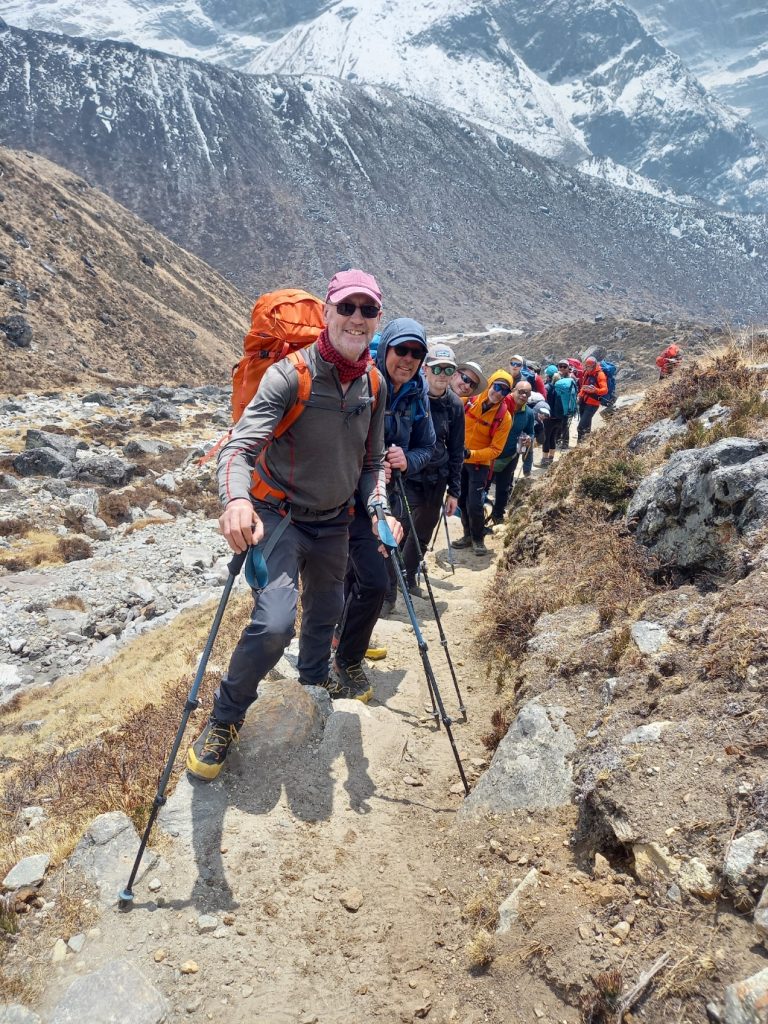
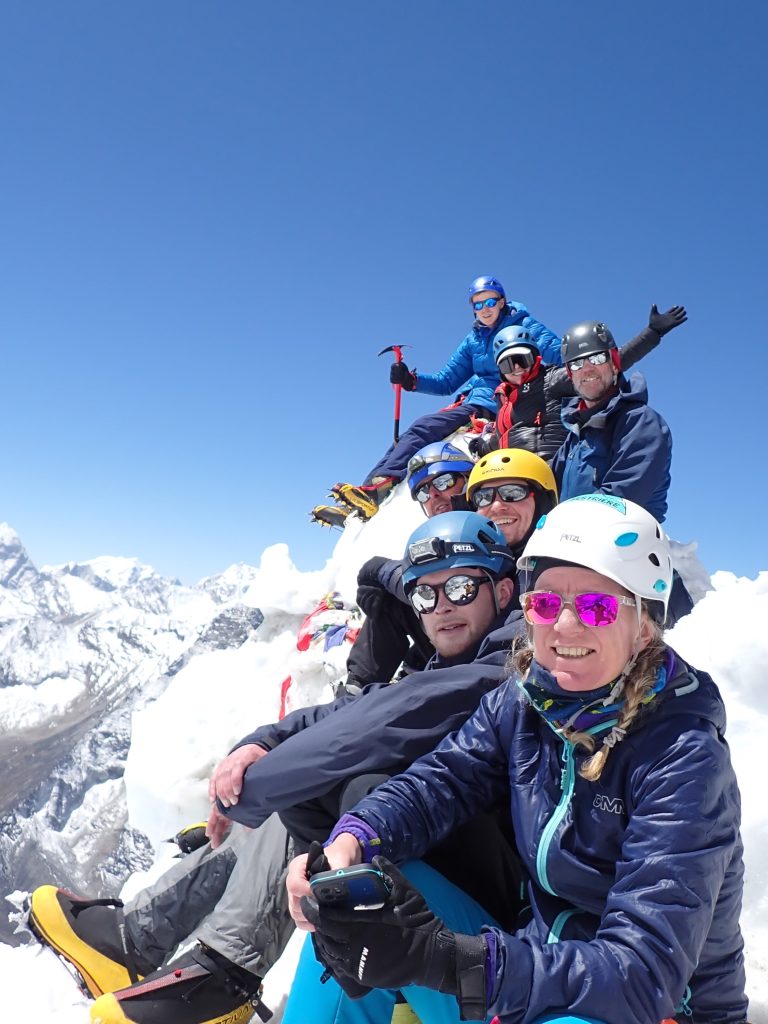
Training for the trip was a gradual affair but over the winter months was accelerated with gym work as well as local walking and several visits to Scotland for multi-day mountaineering trips. A training weekend with Adventure Peaks in Langdale was a great opportunity to speak with their staff and air thoughts about a broad range of topical subjects. New equipment was bought or hired for the harsh, high-altitude conditions. It was useful for us to have a training session at home to familiarise with jumar ascenders, figure of eight descenders, ladders, boots and crampons when wearing different combinations of gloves, mitts, goggles, down jackets etc. Vaccinations were also updated to ensure that we were fully prepared for spending time in very remote areas of Nepal.
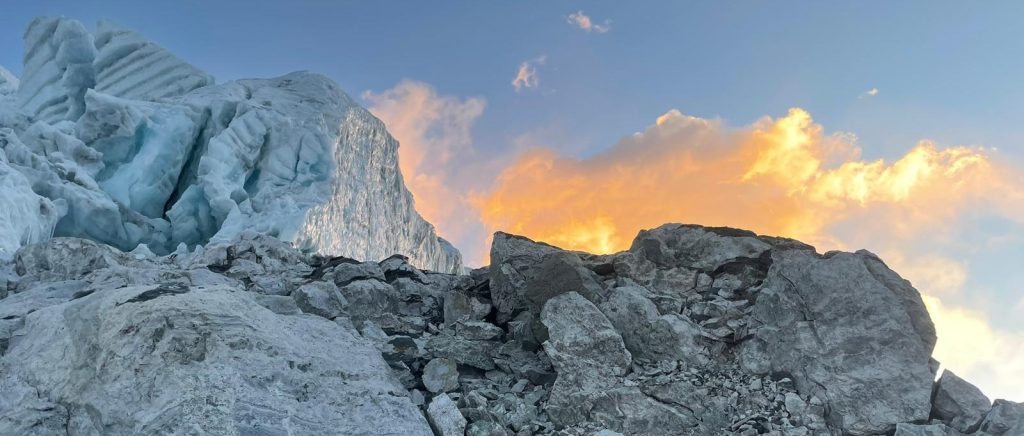
Flights had been arranged from Manchester to Kathmandu via Doha. All our gear and clothing required for the four-week mountaineering trek meant that the baggage weight limit was a close-run thing. The scheduled seven-hour transit stop in Doha proved expensive owing to the extortionate price of a cup of coffee or a pizza, however, the fights were on time. Baggage reclaim and immigration procedures at Kathmandu were not too tedious and the anticipated transport was waiting to take us to our accommodation in Thamel where we met other members of our group.
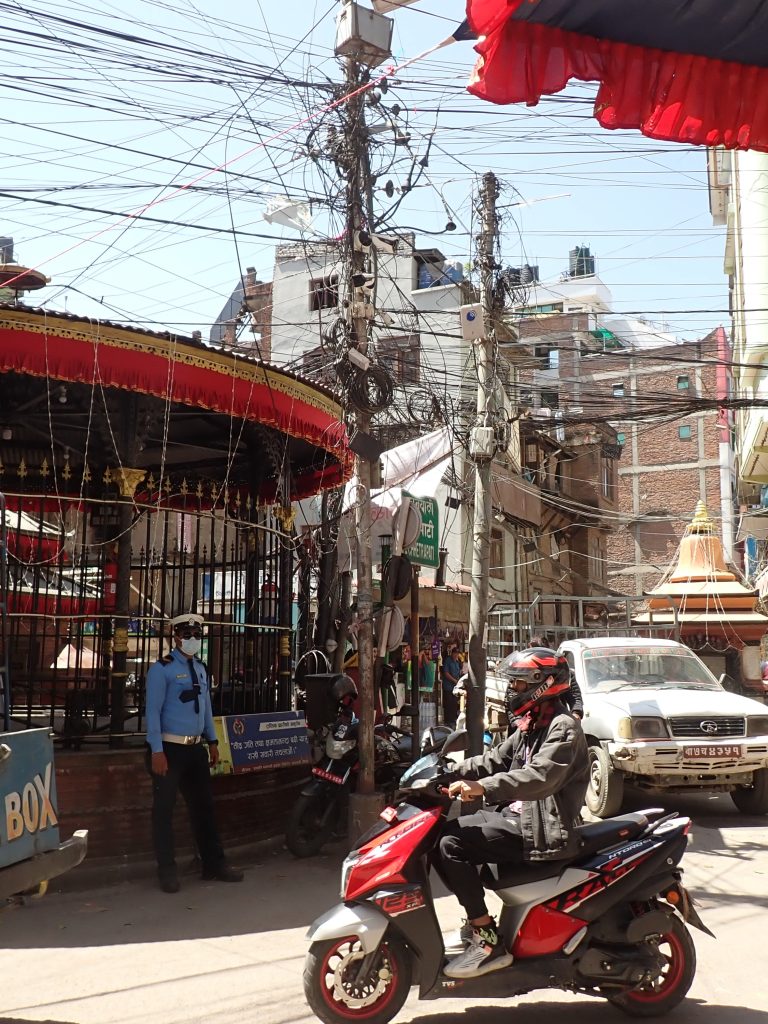
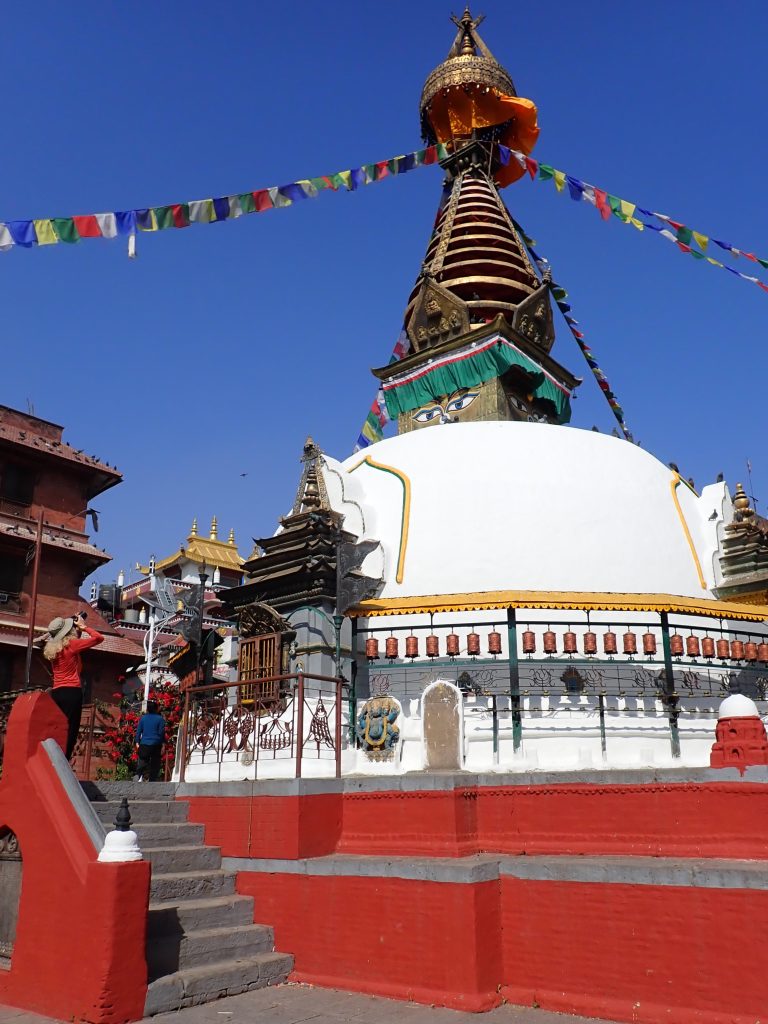
Our UK leader, Carrie, arranged for the whole group to meet for lunch where we would introduce ourselves. Our team included a mix of age, background and experience with Derek and Dave being at the senior end of the spectrum. Ten members of our group were aiming for Mera Peak and seven of that group would continue to Island Peak. There were two additional members who were trekking to Everest Base Camp and would separate from us after flying to Lukla. The afternoon was mainly spent repacking rucksacks and resting but some bought sim cards and other last-minute shopping before enjoying a cultural evening with Nepalese food, music and dance. A fine meal was had by all but an early start was beckoning with the alarm set for a 2am departure.

The 1st of April 2024 began with a four-hour drive to Ramachap Airport over variable quality and occasionally non-existent roads and winding mountain passes which focussed our attention and prevented most of us from further sleeping. We arrived at the airport by 6am but owing to a backlog of passengers due to strong winds and flight cancellations the previous day we did not depart for Lukla until 4pm. Despite being a long, hot day at Ramachap the anticipation of the brief excitement of the flight and what was beyond maintained everyone’s high spirits. The initial plan was to begin our trek immediately after landing in Lukla but because of the delay we remained overnight in a lodge at Lukla which was a welcome relief.
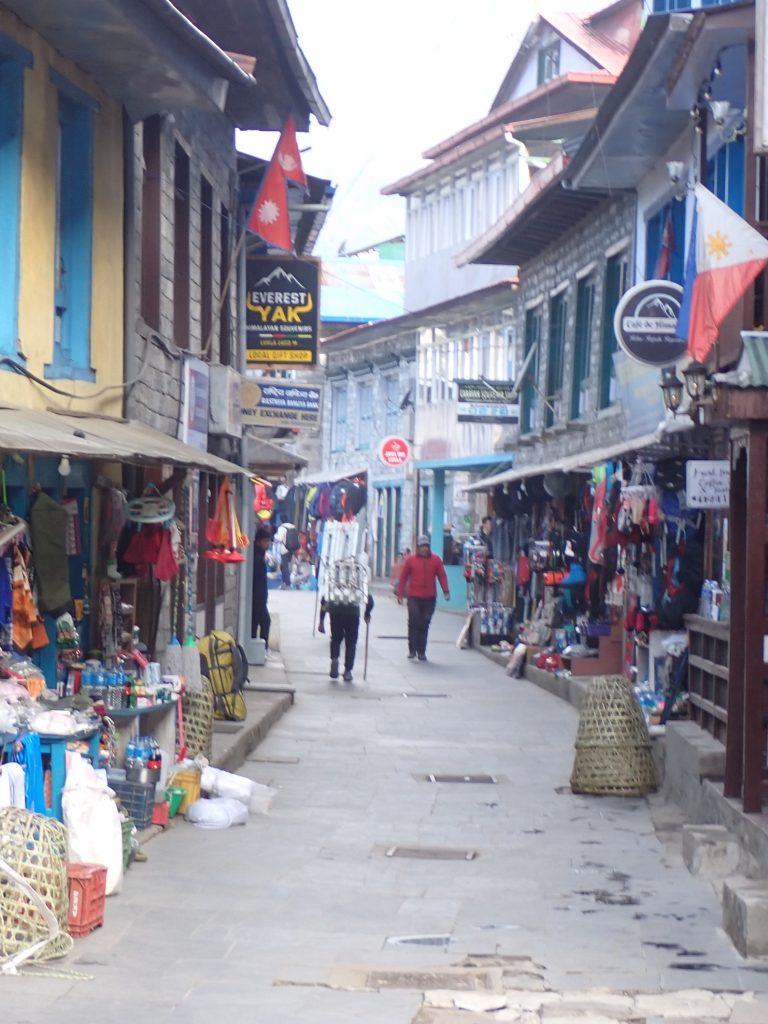
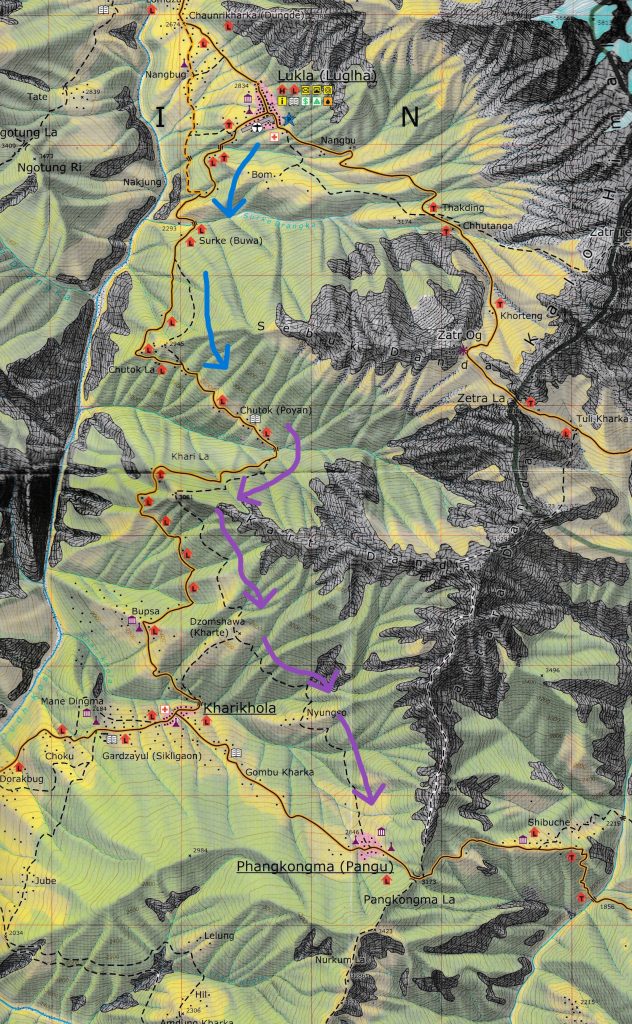
The local dogs of Lukla served as an alarm clock with a dawn chorus of loud barking around the town. Nonetheless we mostly had a good night’s sleep and were ready for the trek. Everyone had paired off as roommates and remained, voluntarily, in those pairs until the end of the trek. Our evening in the lodge had allowed us to meet our local Sherpa Guides and our porters. Janga was our head Sherpa and he had taken the opportunity this first evening to introduce us to his system of taking and writing down menu orders for meals in advance in the hope that you would remember what it was when the time came to eat. So much stress at breakfast time! Was it an omelette or porridge? Coffee? Mint tea? Mint tea with lemon or was that with honey and ginger? Somehow it all worked out.
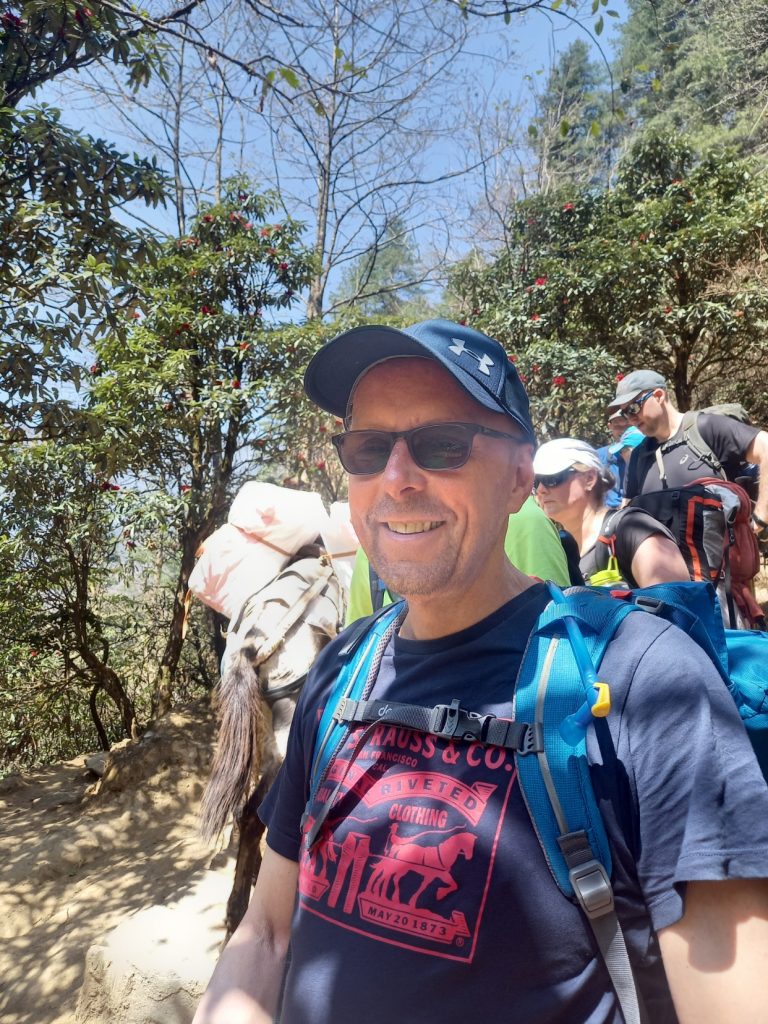
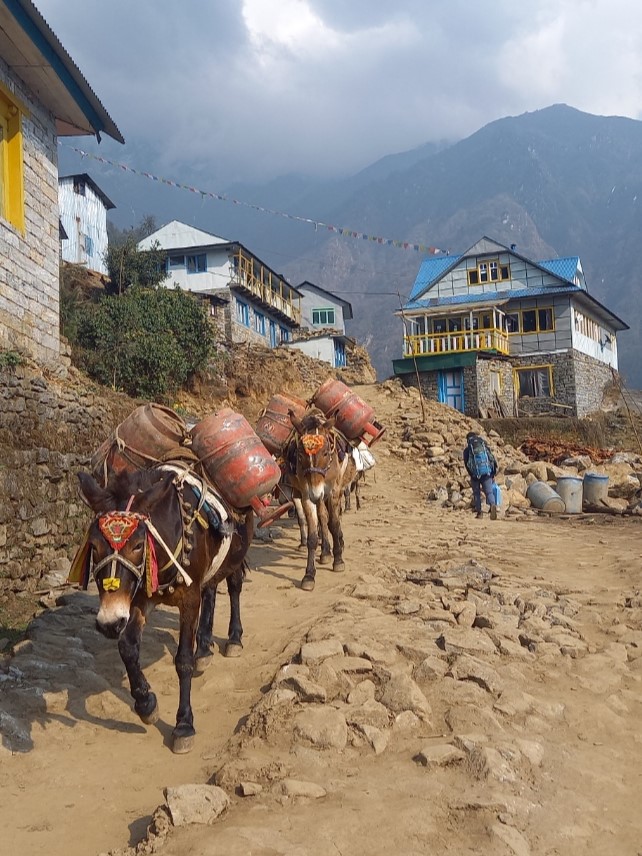
The first day of trekking from Lukla to Poyan was relatively short and remained at around 2800m. There was no need to make up for the lost day since several spare days were built into the itinerary. Over the next few days we gained altitude and the scenery changed as we headed into more remote territory. Night stops in Phangkongma (2840m), Nashing Dingma (2600m), Chalem Kharka (3600m) and Khola Kharka (4200m) with higher altitude passes between them ensured that our acclimatisation was steadily progressing.
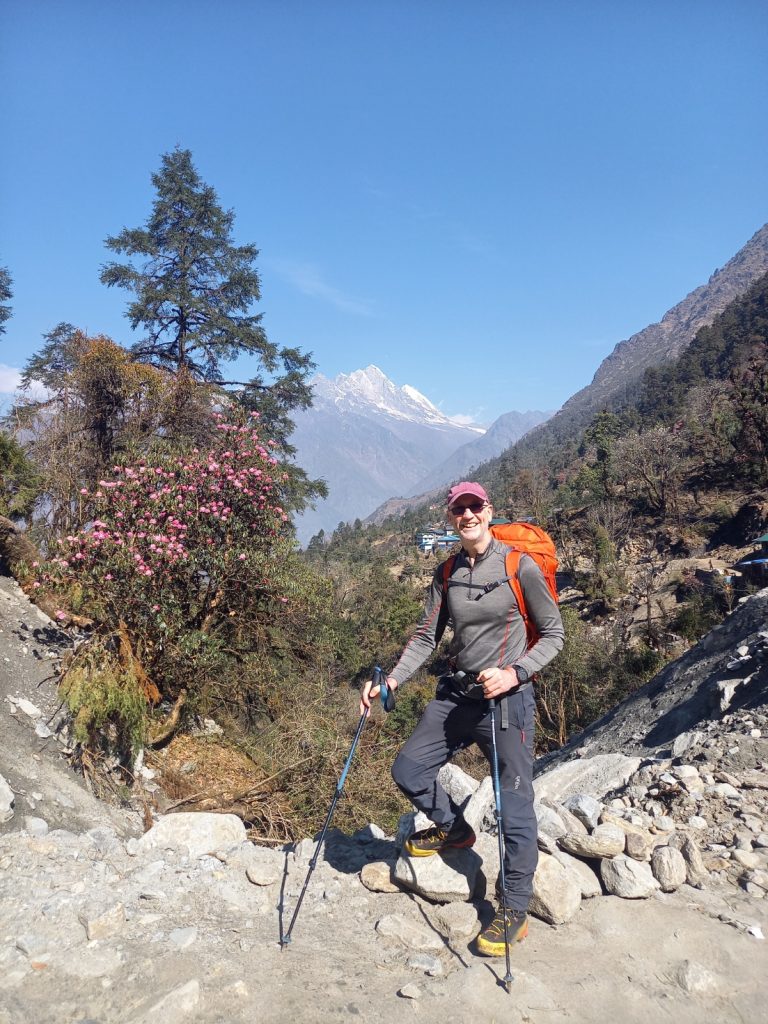
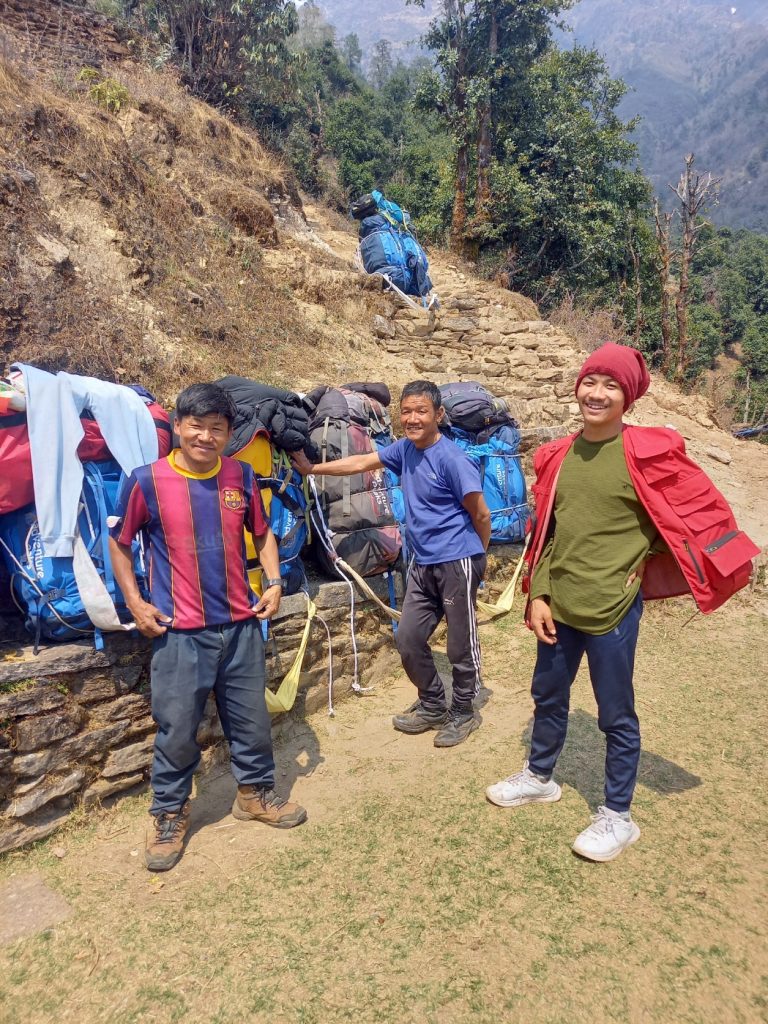
There was a lot of donkey traffic on the lower routes carrying goods between villages but thankfully less so higher up. Porters were carrying huge loads and all supplies for the teahouses and everywhere else were brought in by man or animal. The price of a Snickers bar increased with remoteness and the facilities available may have lessened although the service and welcome were never in question and there was never a short measure of Dal Bhat. There was very little trekking traffic. Our chosen route towards Mera was more remote and significantly quieter than the main trekking routes.
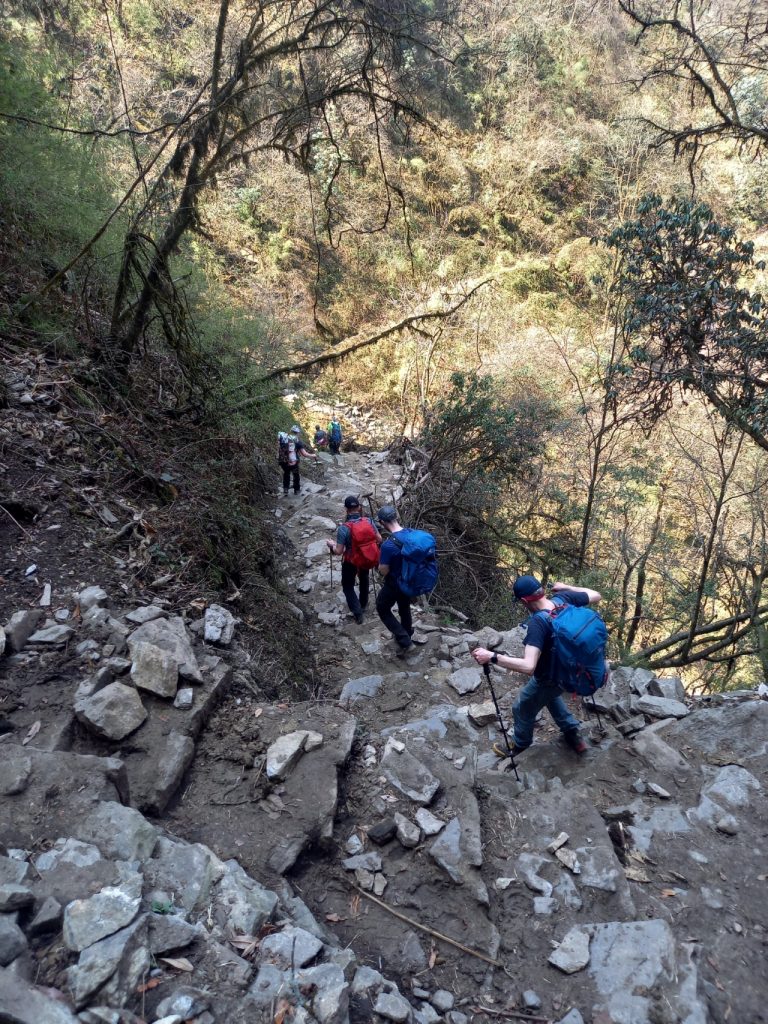
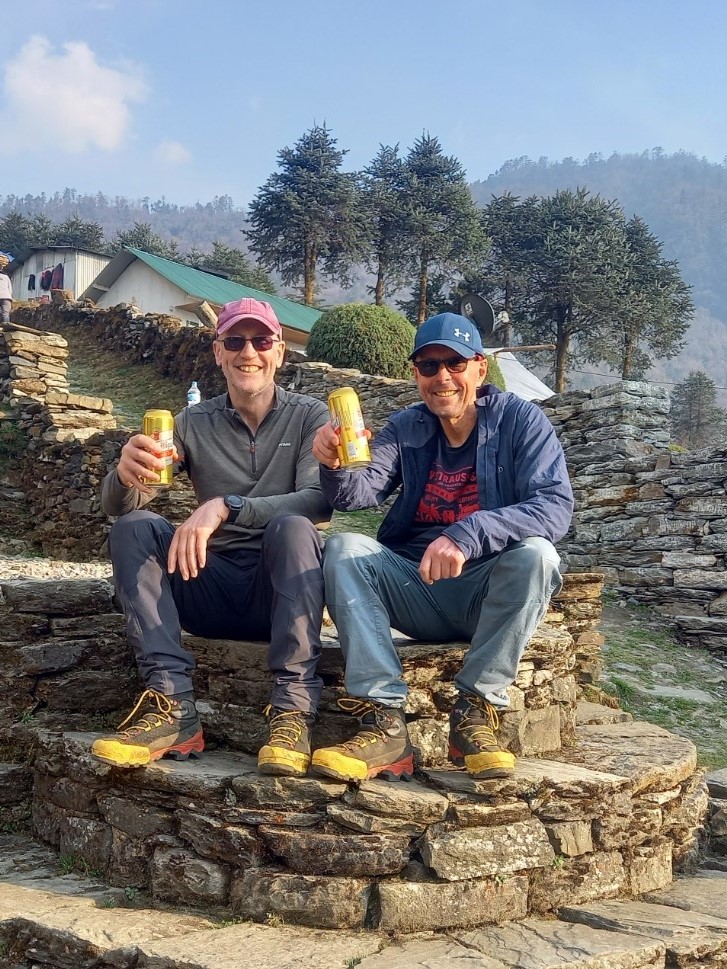
Like in the UK at springtime the rhododendron and magnolia trees were in bloom and many other native flowers patterned the lower slopes and forests. Often the scenery was quite a display of colour. The weather had been perfect so far with good visibility and warm, sunny conditions although we briefly encountered snow when crossing the pass into Khola Kharka.
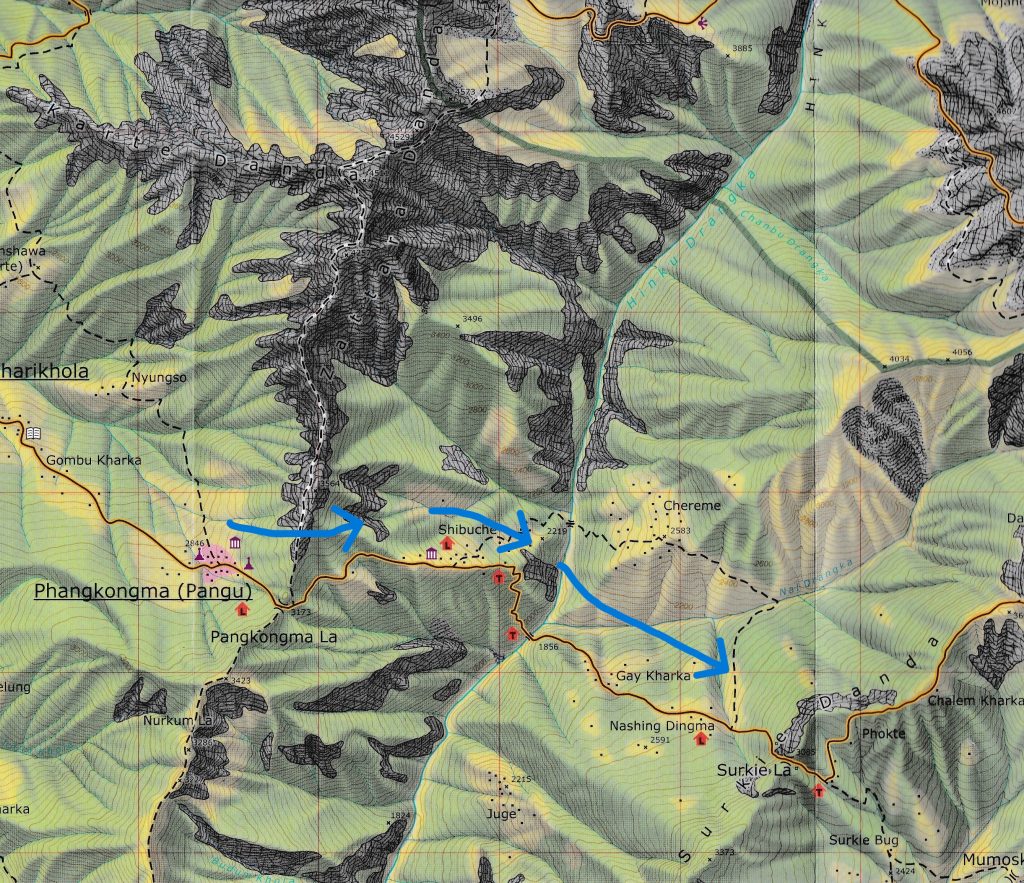
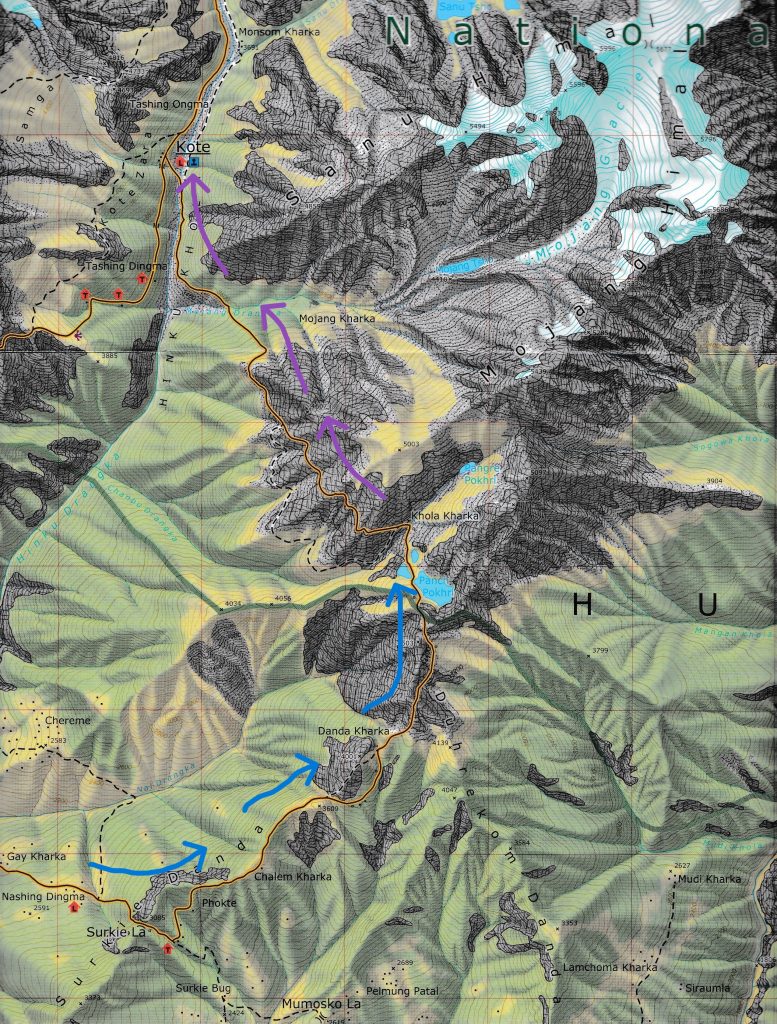
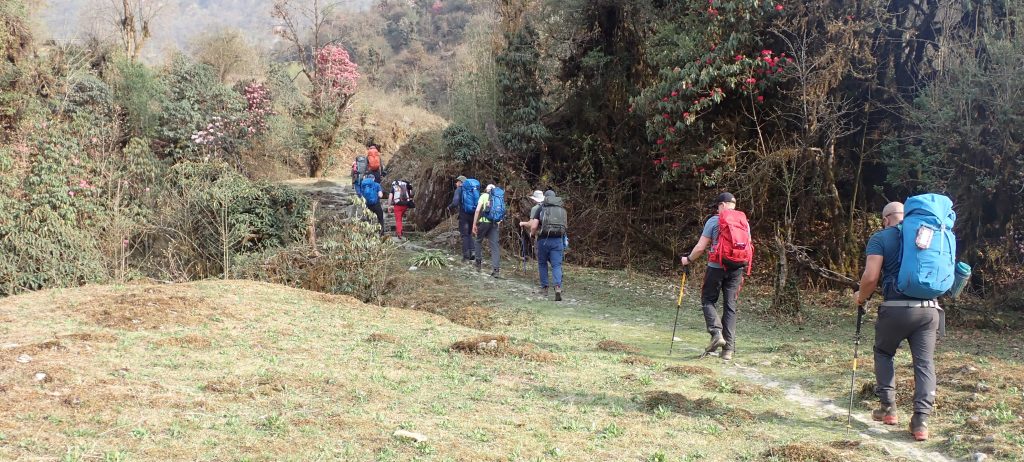
From Khola Kharka we headed north west to the Hinku Valley then continued north, gradually gaining altitude. Kote (4200m) was our next night stop followed by Tangnag (4320m) and Khare (4850m). We had a short acclimatisation walk up to 5200m after arriving in Khare followed by a rest and training day where we practiced working with our Sherpas and personal mountaineering gear, ropes, jumaring and abseiling in preparation for both Mera and Island Peak. The route up to Mera Peak was clearly visible from here with occasional lines of tiny people crossing the high-altitude glacier.
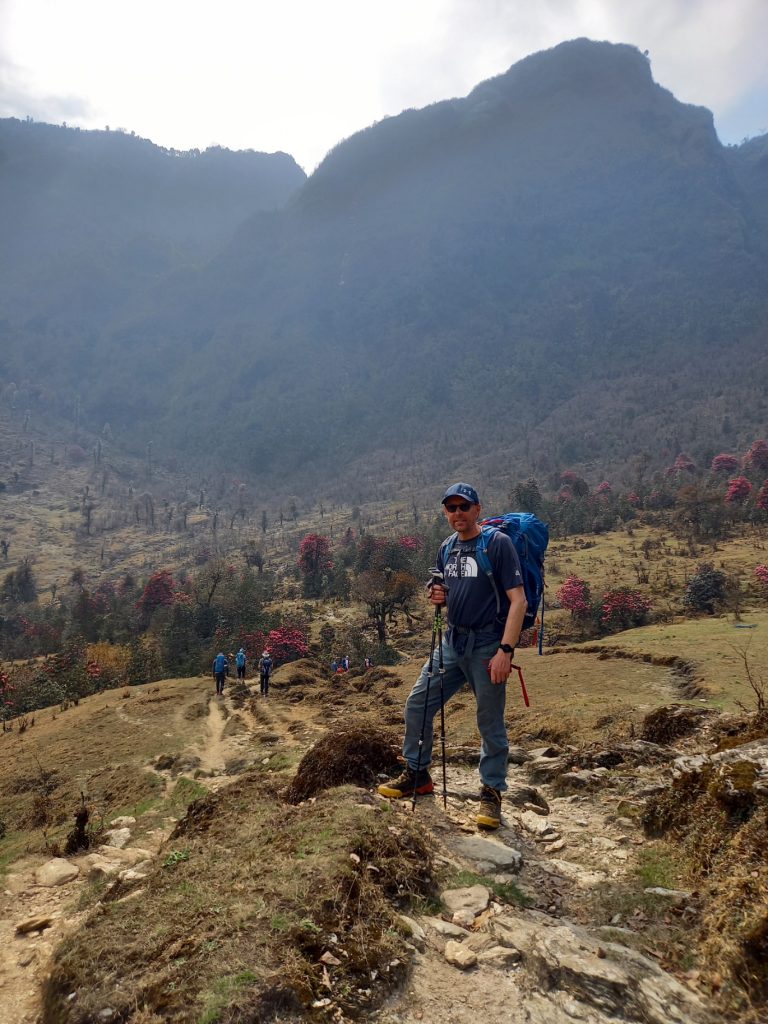
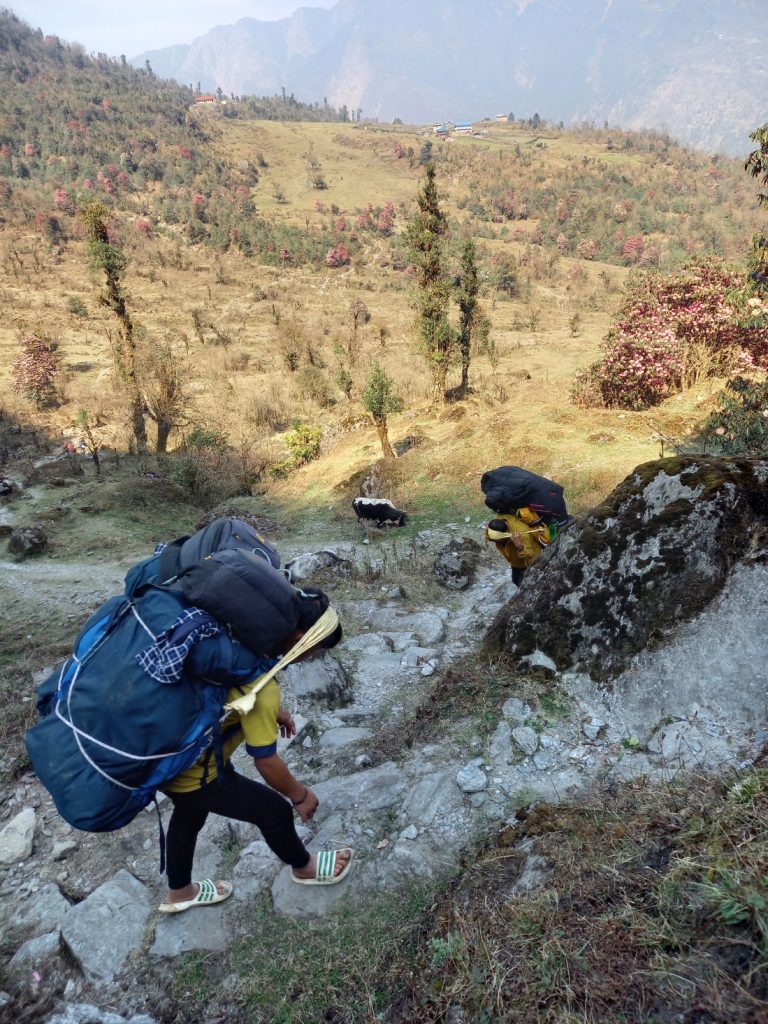
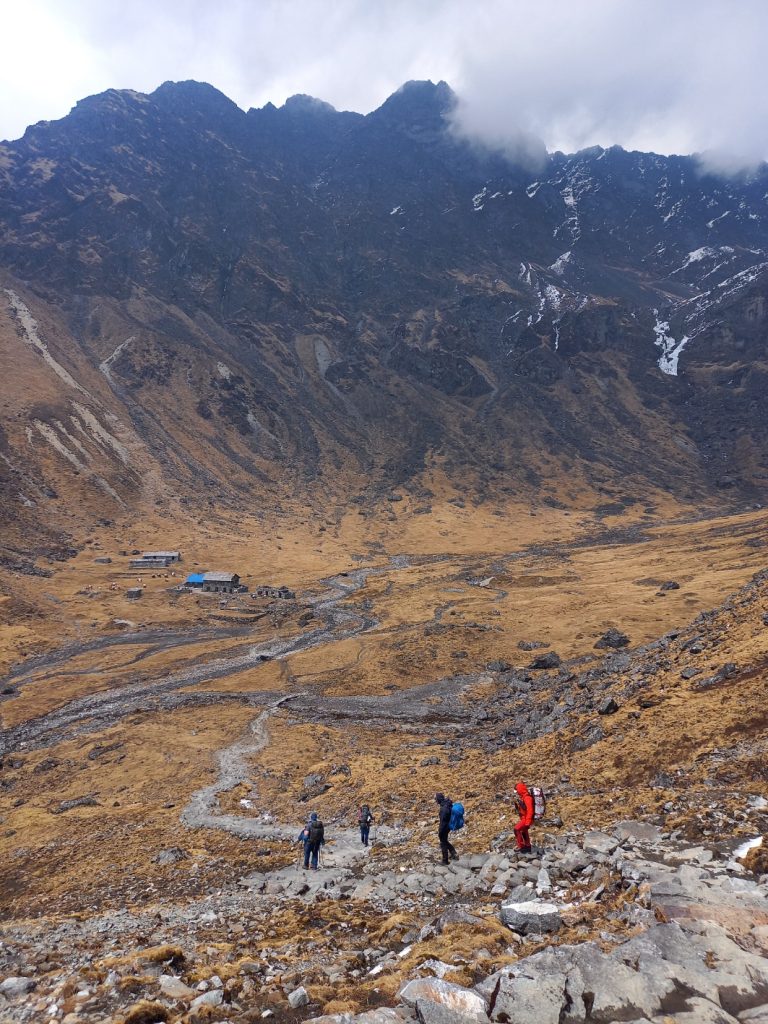
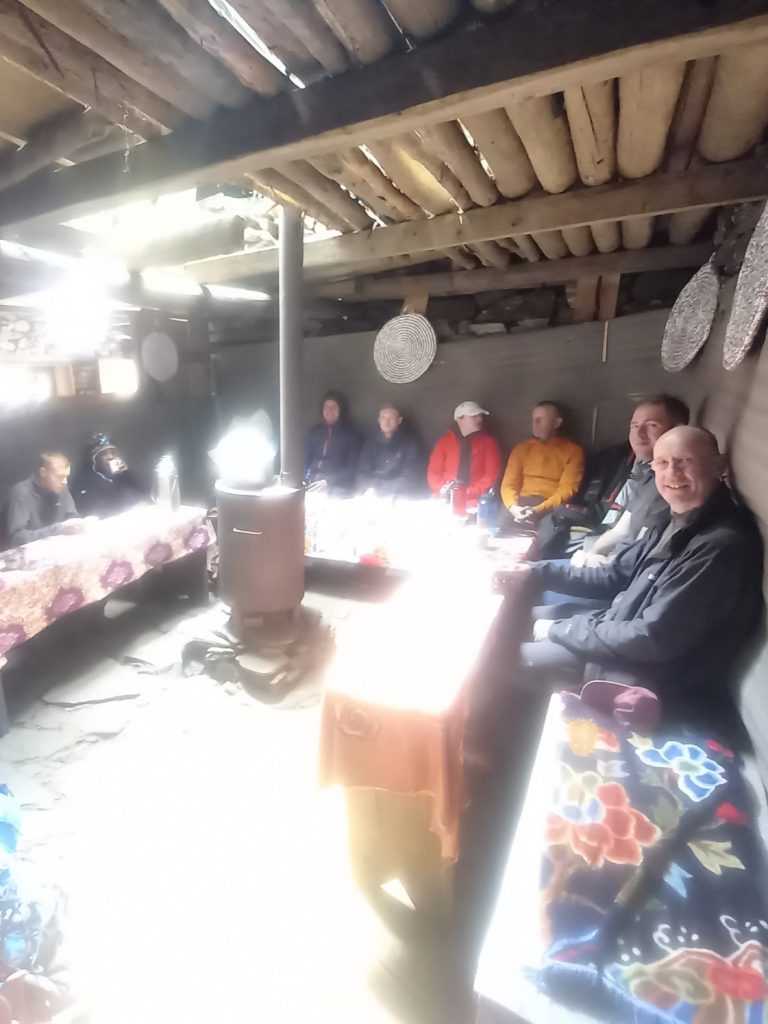
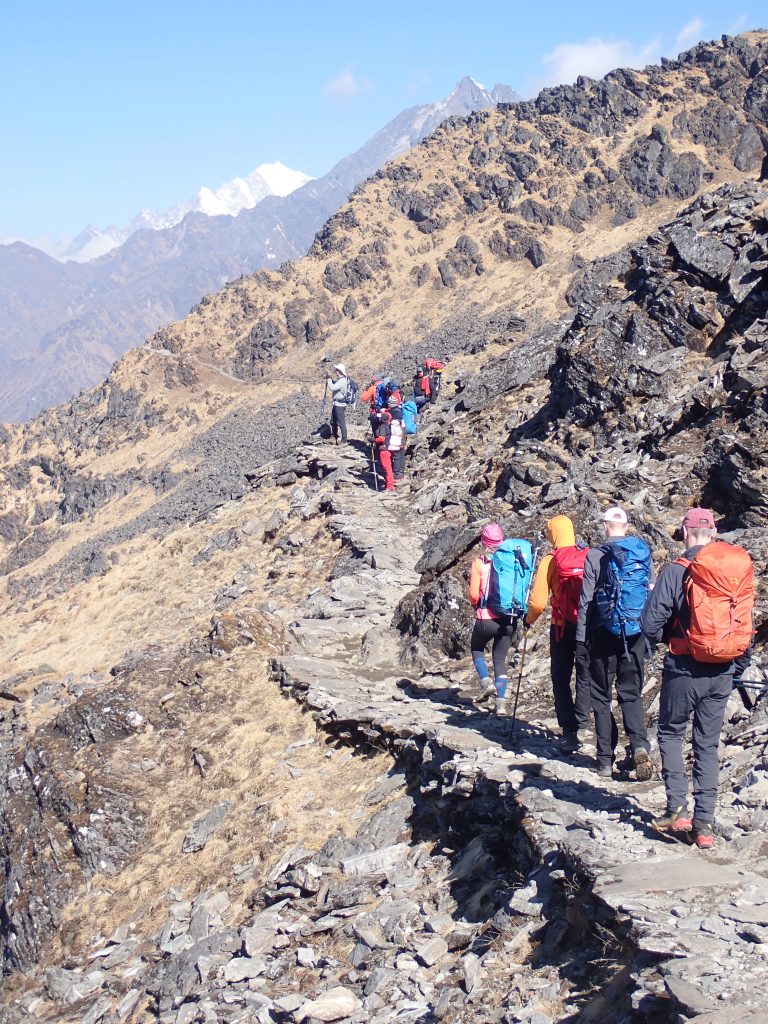
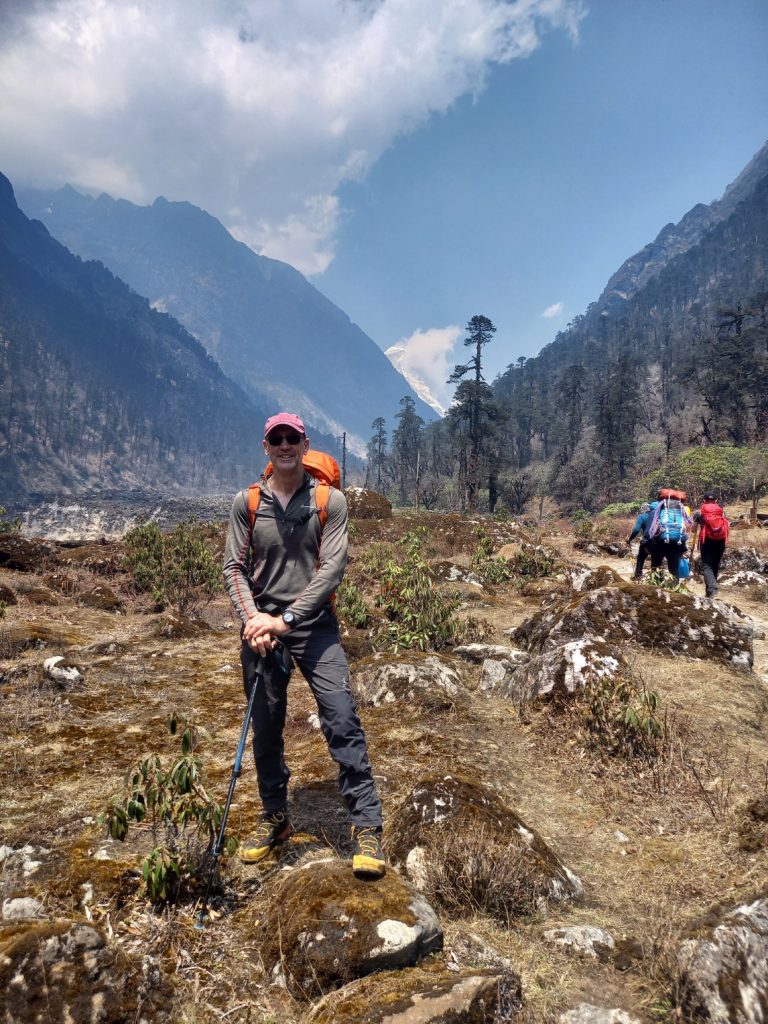
The trek up the Hinku Valley had taken us through the disturbed landscape and debris that had been washed out in the flood of 1998 when the glacial lake above Tangnag burst its banks. The trail here is less remote and popular with trekkers and the standard of accommodation became more western orientated. So much so that Dave had a shower. To maintain the western trend almost the whole team had veggie burger and chips for lunch for two days running when in Khare.
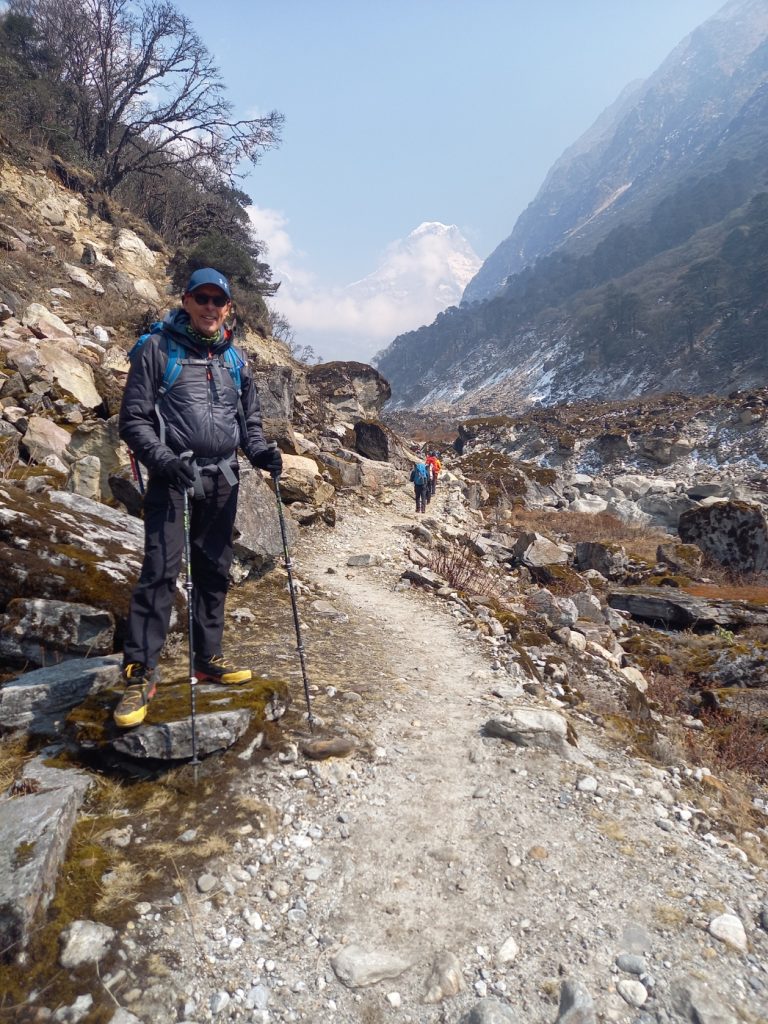
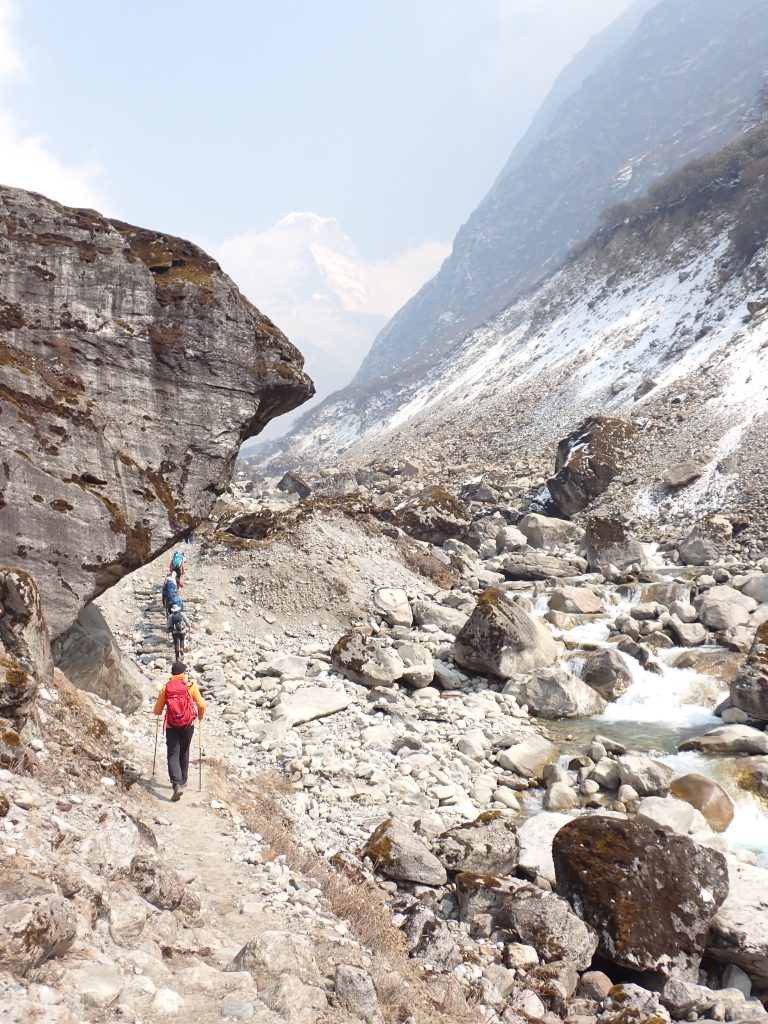
The next night stop was at our Base Camp near to the Mera La (5300m) and following that was High Camp (5750m) for Mera Peak. Both nights were in tents and the going was getting tougher at significantly higher altitude. An acclimatisation and training walk from Mera La gave a valuable opportunity to train with ropes, crampons and axes on the glacier. Cloud had reduced the visibility at our altitude, however, the forecast for the following days was good.
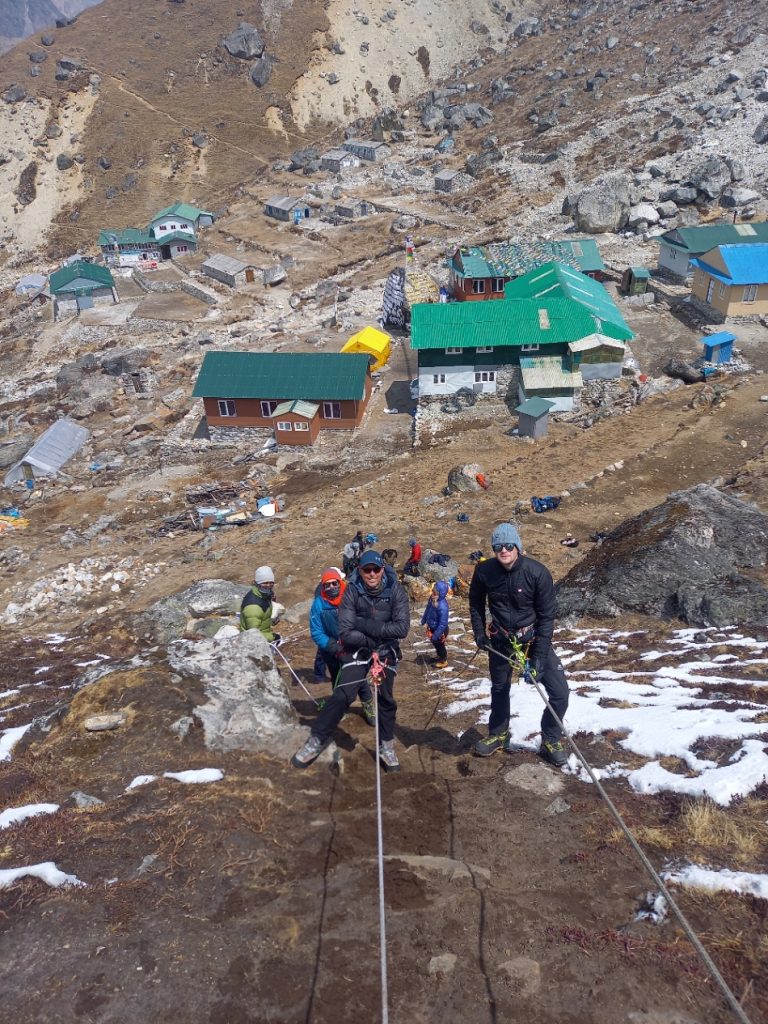
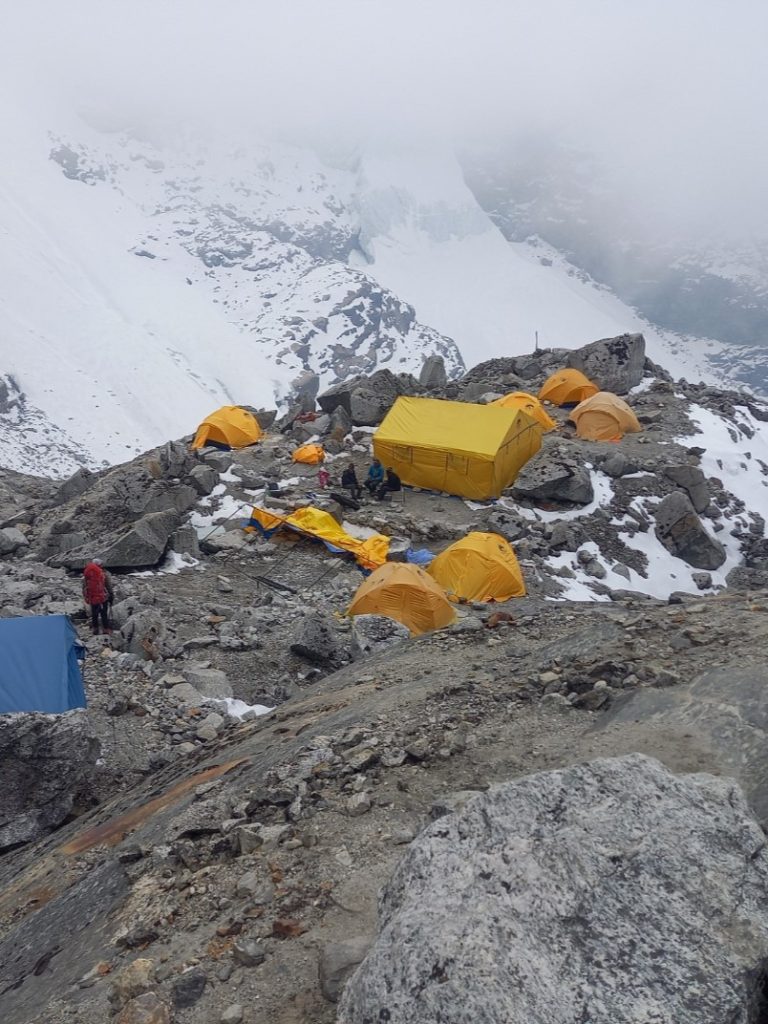
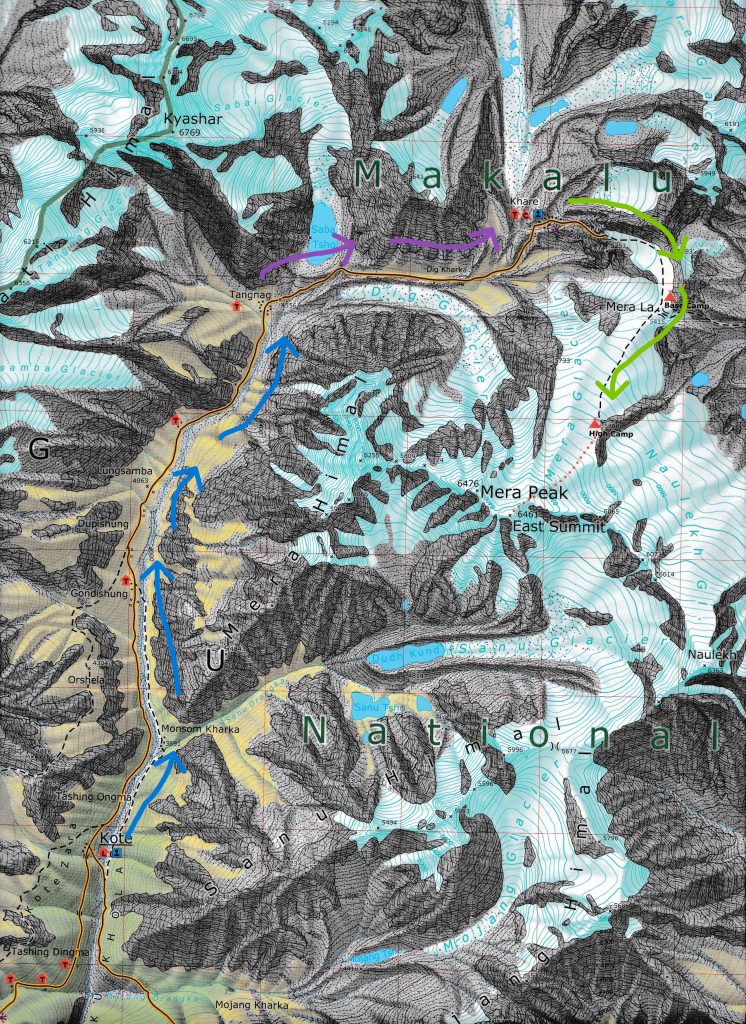
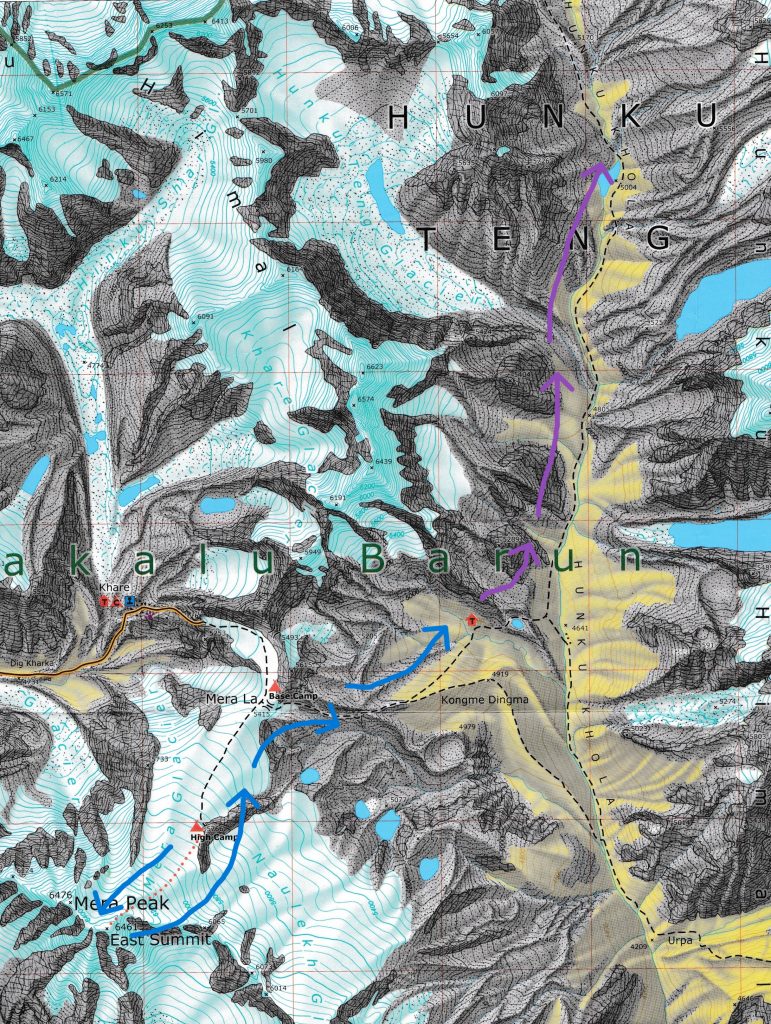
The walk up to High Camp was particularly tiring. It was a steep ascent, roped together and in crampons. For some of the team it was a very recently acquired skill. The Sherpas were brilliant at encouraging everyone, carrying their own heavy loads yet still beaming at everyone else’s efforts. The porters too, gave their all to bring our heavy kit bags up to High Camp although they didn’t hang around for too long. There was a fixed menu tonight but our Sherpas delivered food, tea and hot water to every tent to help prepare for the early start to summit Mera Peak.
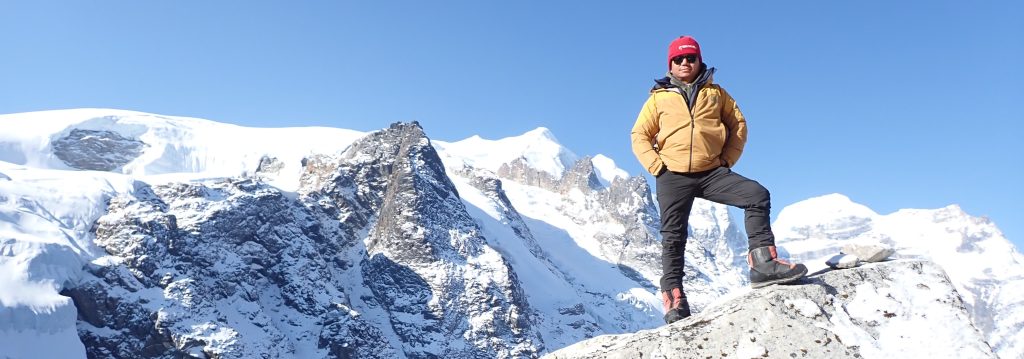
We had a 2am start in the cold and dark but there was no wind and a clear sky. Perfect. The Sherpas had brought tea and porridge plus a packed lunch for us all as we readied ourselves in our tents. Teams roped together. Derek and Dave were placed in separate groups but the mental scars have since healed. We set off. It was a slow, plodding ascent with many stops to keep the legs from burning up and allow everyone to take a breather. Headtorches were visible ahead and behind our groups but there were relatively few people on the mountain.
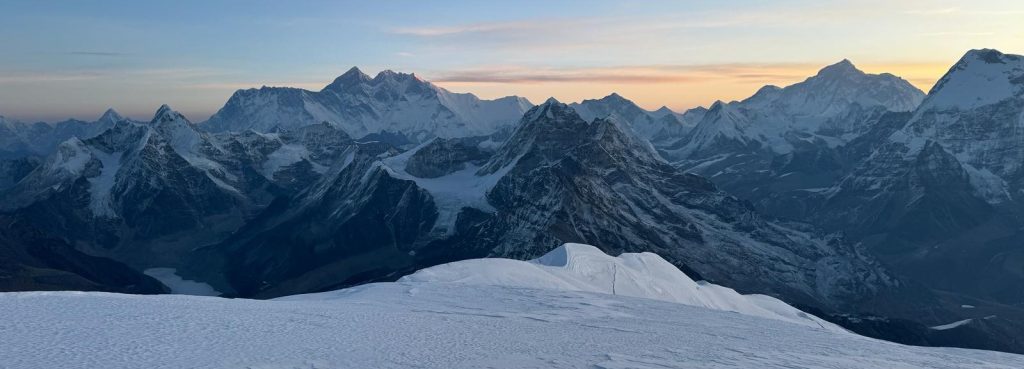
Dorje Sherpa and Sherpa Bal Kumar Rai with Dave and four others made it to the summit at 0620. This was the Easten Summit of Mera Peak at 6461m. There was hardly a breath of wind, the sun had just risen and the views were unlimited towards Everest and around the full panorama. The other groups were clearly visible coming up the glacier towards the final ridge to the top.
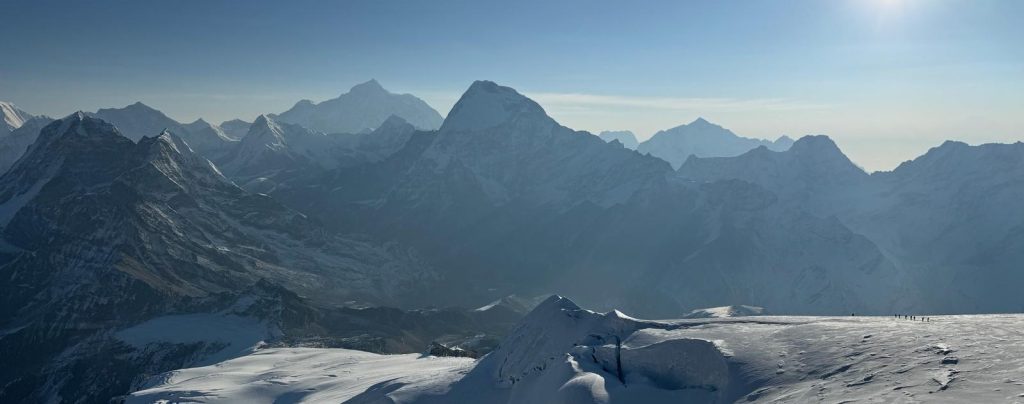
Derek and his team summited a short time after Dave’s group had started their descent. Derek’s group had endured despite their suspicion that the altitude had given minor grief to one of their number. One member of another group did not make it all the way up to the summit and had returned to High Camp with a Sherpa.
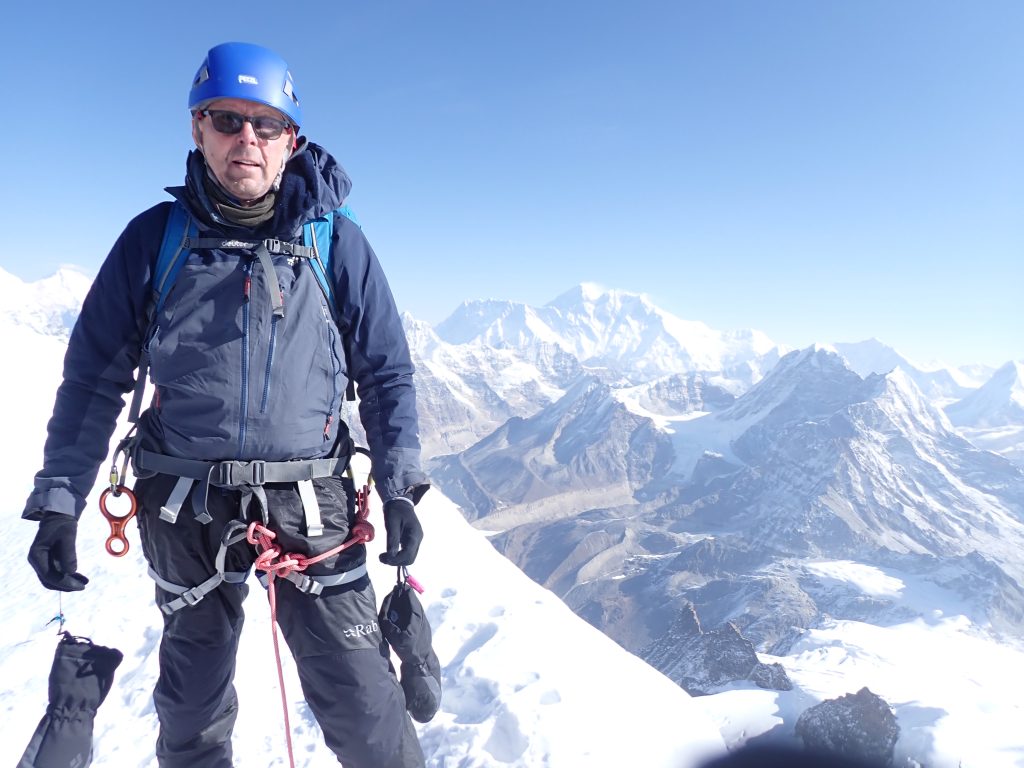
The descent to High Camp was a lot easier than the climb although the sun was warm so drink stops were needed and down jackets were readily packed away. A sense of achievement was prevalent in everyone but a lot more was in store for this day and continued concentration was essential when traversing the glacier.
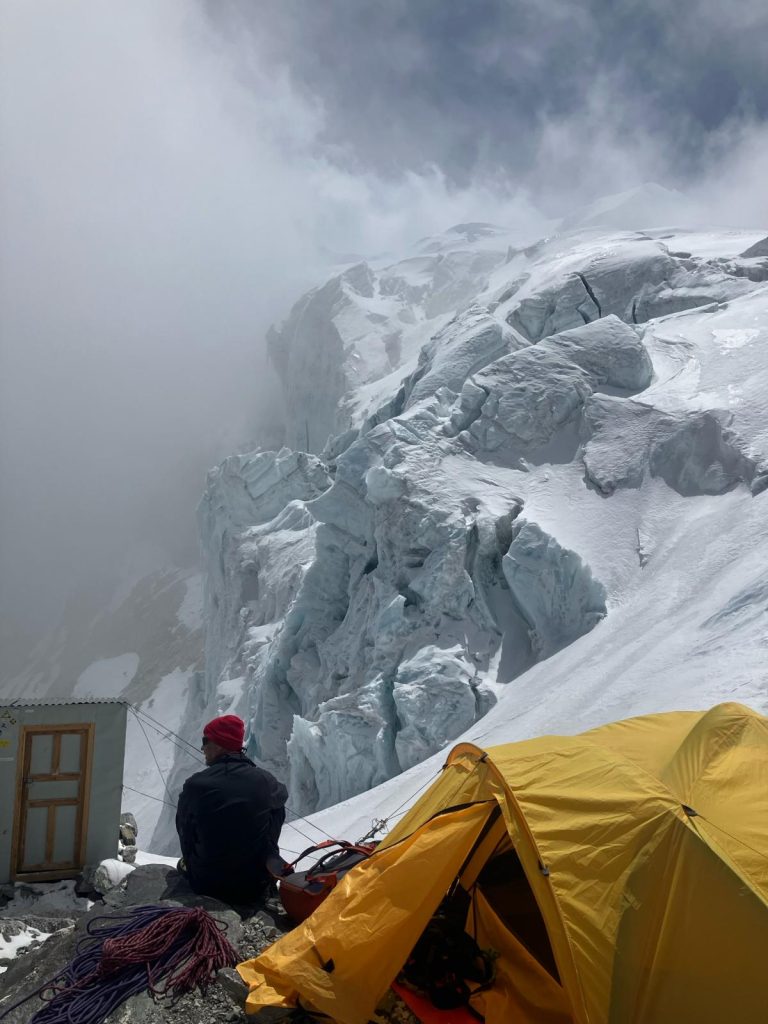
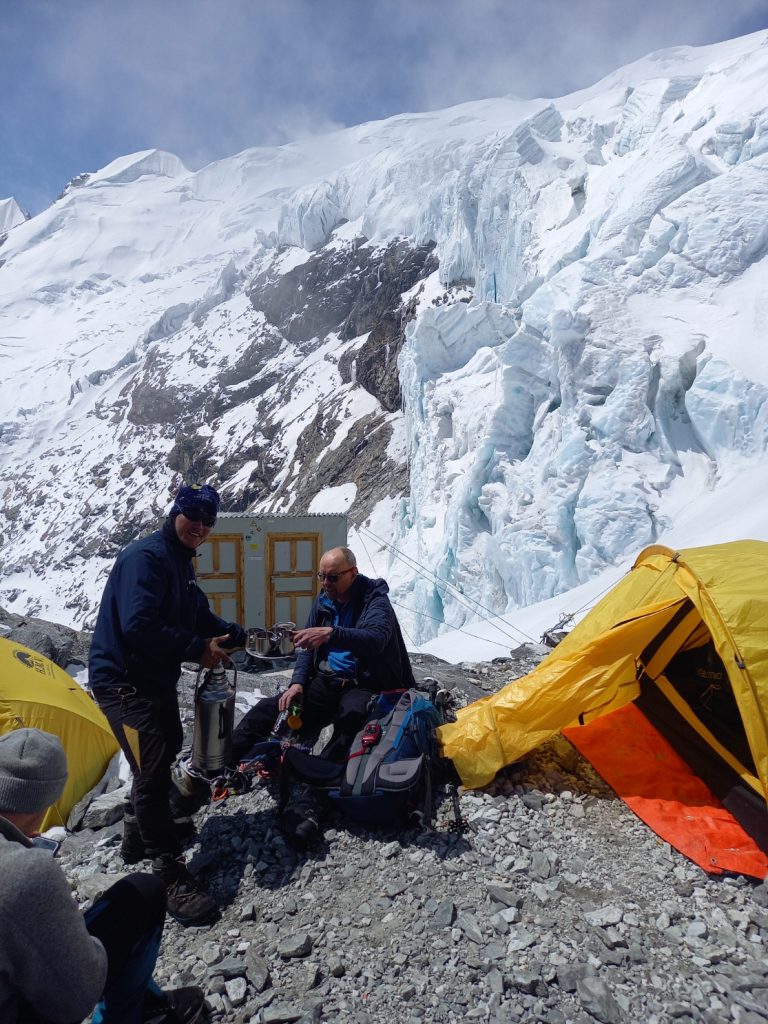
Groups returned to High Camp in due course and there was time for a brief rest and more cups of tea. The Sherpas performed magnificently. The porters arrived for our baggage and we all set off together for Mera La. This was the point at which we said farewell to the 3 team members and their support who were now heading back to Lukla. Our group, making for Island Peak, descended east at the col and to another week of camping. The others, returning northwest towards Lukla, would be in the teahouse at Khare by the evening.
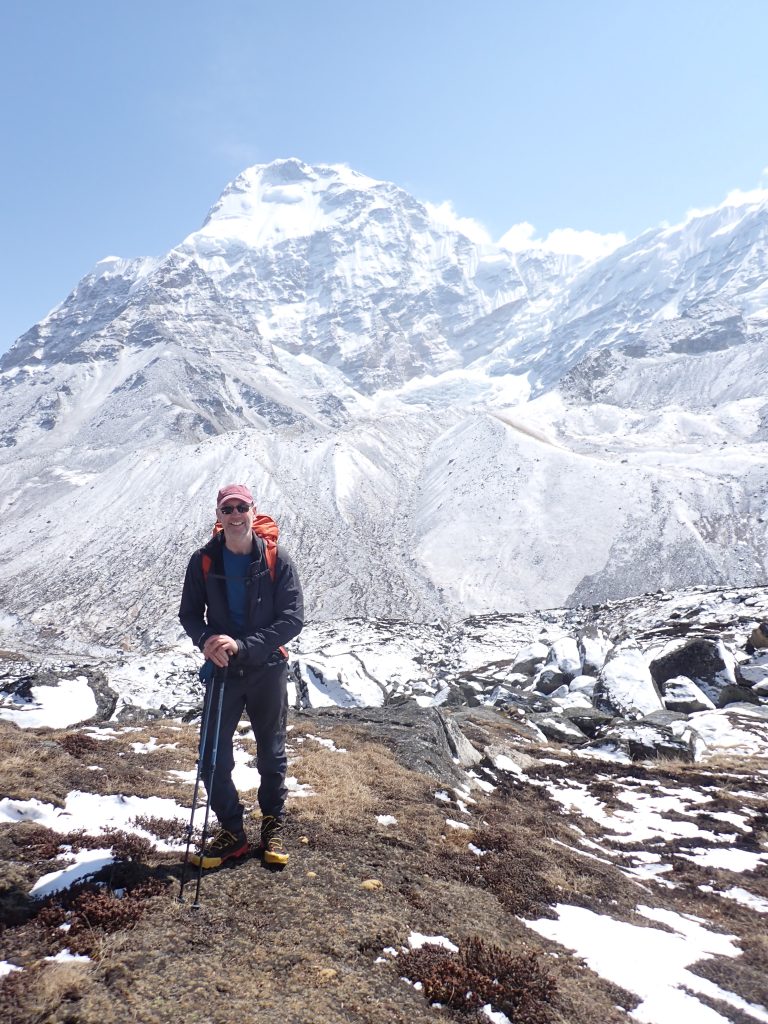
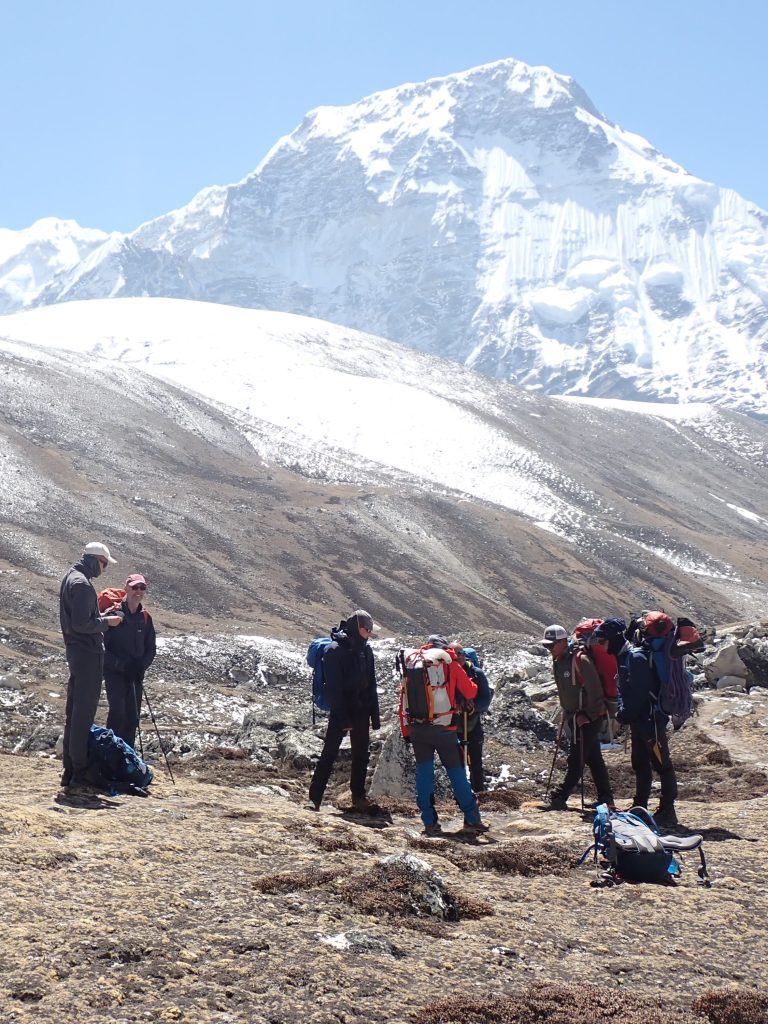
The Island Peak team was seven plus Carrie with supporting Sherpas and porters. The long descent from Mera La took us down to Kongme Dingma (4800m) where we spent one night. In the morning we joined the Hunku Valley from the west side and continued our trek northwards. The valley was a post-glacial wasteland of rock, moraine ridges, frozen lakes, a river and somewhere a path. It was very impressive, being more remote than anything we had seen so far and with a sense of near lifelessness. The immense, wind-sculpted mass of Chamlang, a 7319m peak dominated our eastern flank for the whole day’s walk from where we entered the valley. Our campsite for this night was based around a lonely teahouse in the Hunku Valley beside a small lake to the north west of Chamlang which was optimistically intended to support the route to Baruntse Base Camp.

Our next day saw us continue north in the valley to High Camp (5650m) for the Amphulabsta Pass (5845m) which we would cross the following day. There was no tea house at this location and the facilities were limited to what nature could give us. The Sherpa support team, however, managed to fix tents, drum up our meals and boil water while the porters continued to haul our luggage.
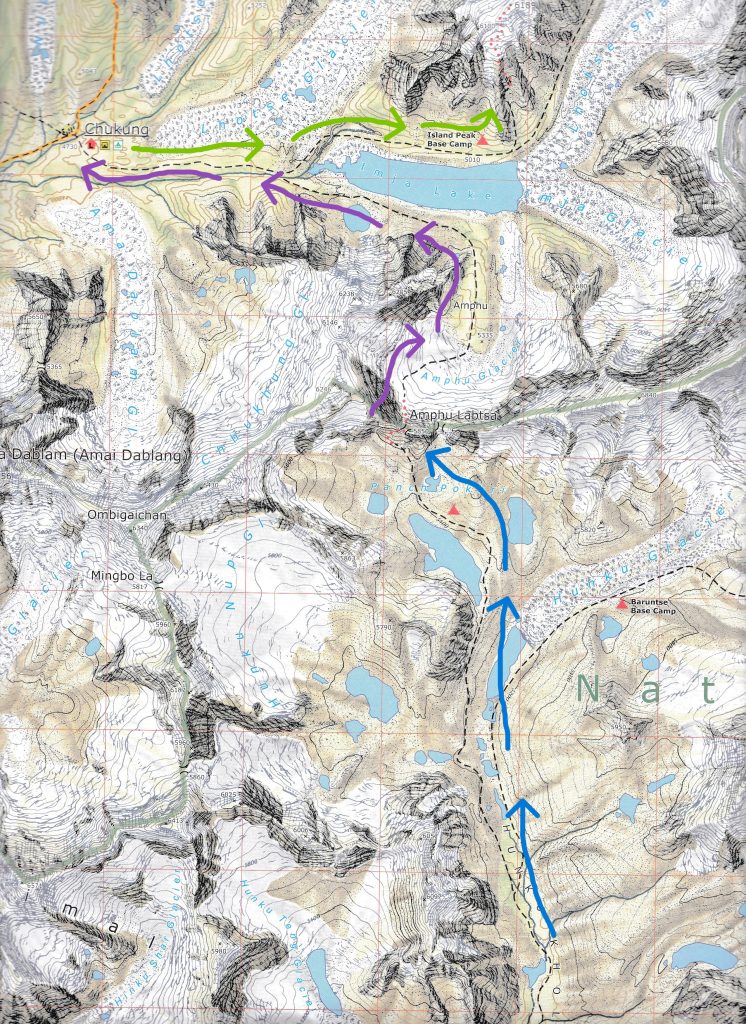
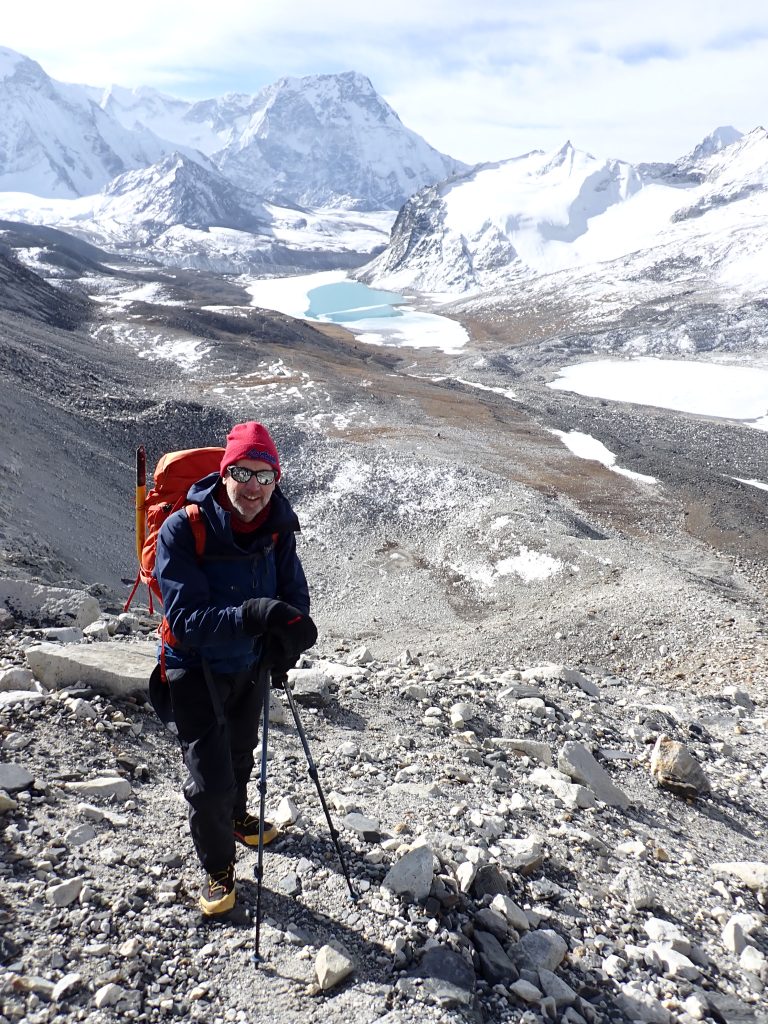
In the morning the team had an early start and after weaving a way up above the initial scree path towards the Amphulabsta Pass the going became technical with fixed cables to cross sections of rock, ice and snow. From the summit of the pass after crossing to the northern side the first part of the descent was on rock. However, a 50m abseil was required down a steep snow slope to regain the path which continued in a steep descending traverse on deep snow. Underfoot conditions were awkward so fixed ropes were set up by our Sherpas which ensured safety but our progress slowed.
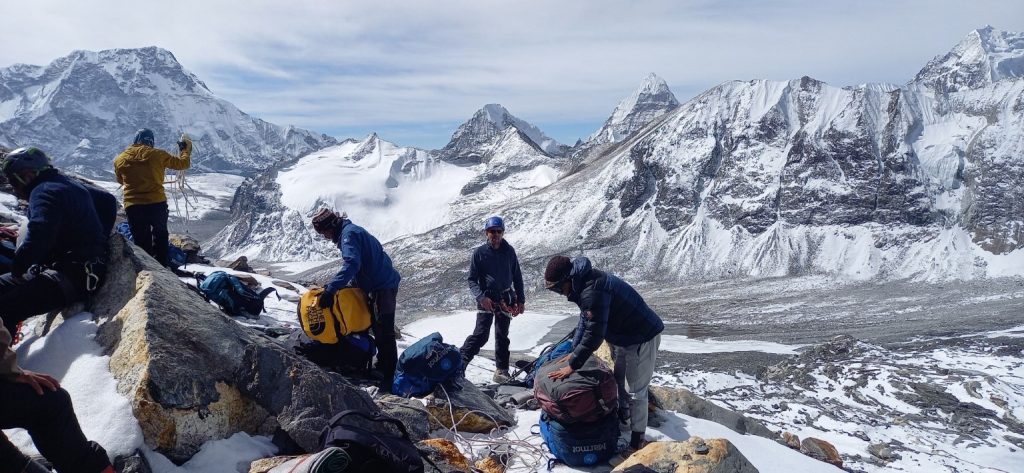
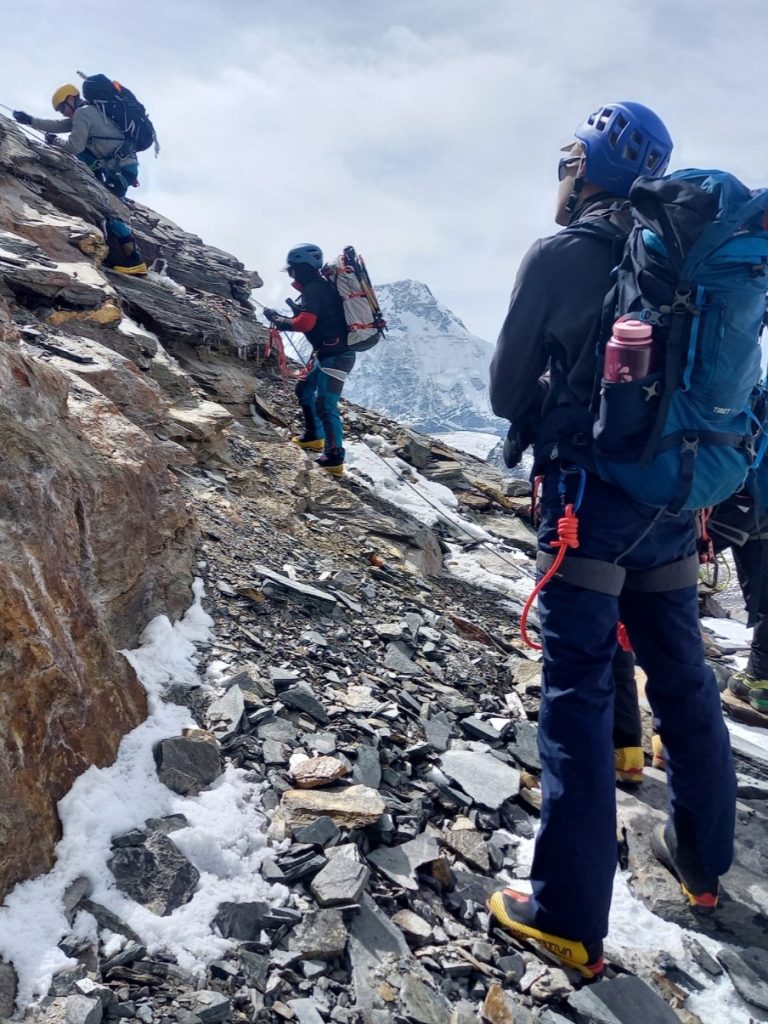
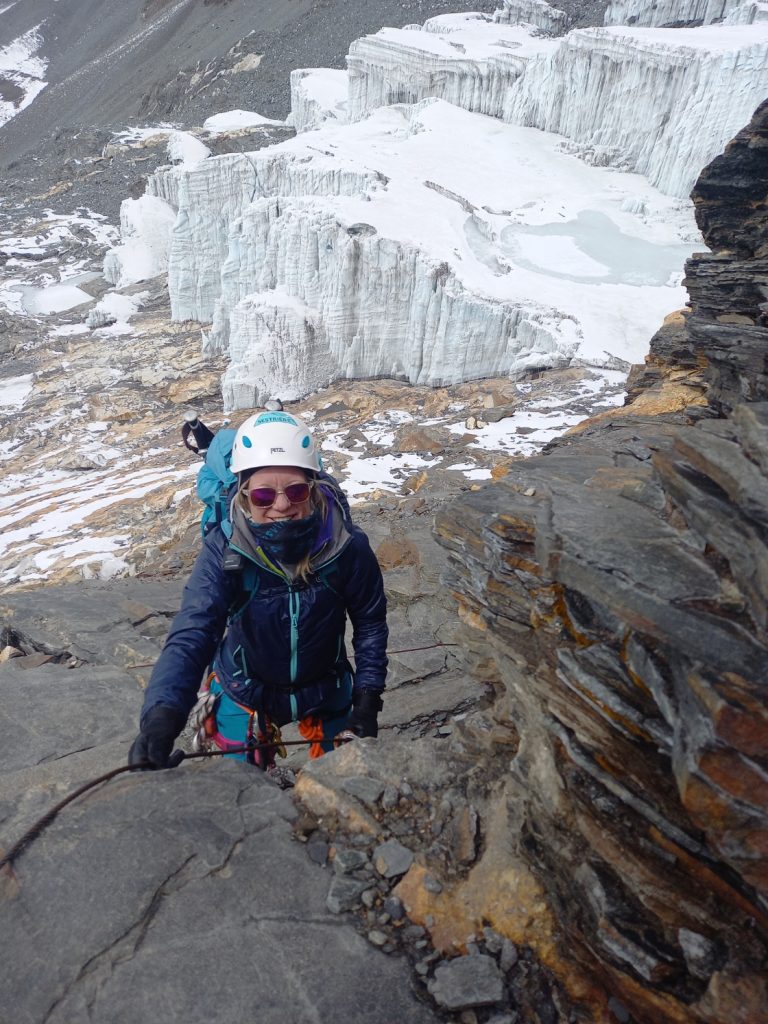
During the ascent to the Amphulabsta Pass one of our porters suffered with altitude sickness. To turn back would mean a multi-day trek to get anywhere so his load was shared amongst the other porters and Sherpas and he volunteered to continue over the pass under the close supervision of his colleagues. On the other side of the pass he made a quick recovery when descending and continued his work until the end of the trek.
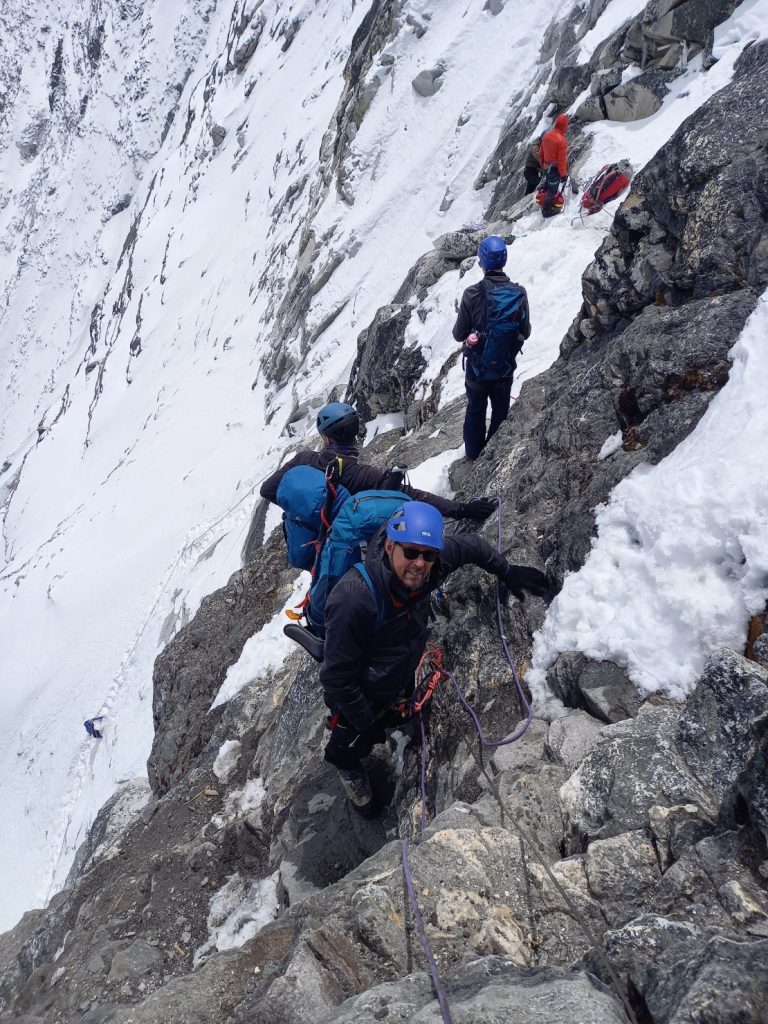
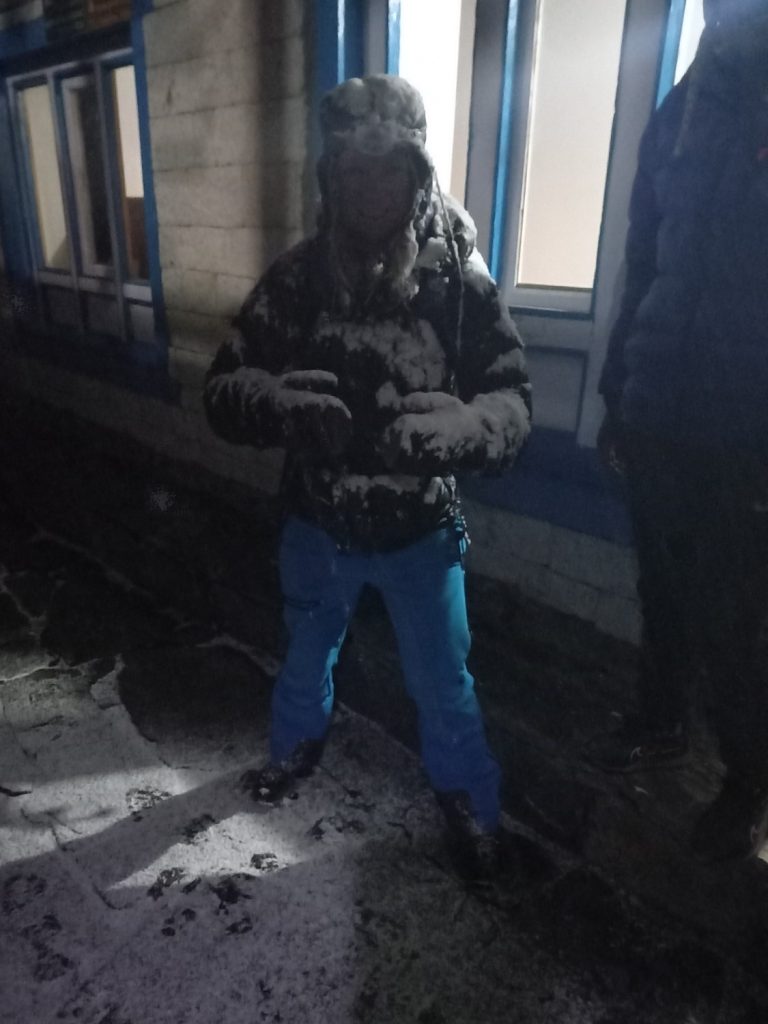
After descending below the snow line the porters, who had gone ahead, and our group met and changed out of high-altitude climbing equipment into more comfortable trekking gear. We were back into a valley full of moraine and glacial deposits. We reached Chukung (4730m) after dark and it was snowing as we neared the village. After such a long and demanding day it was truly wonderful to be in a decent lodge with good food, beds and electricity. We had another rest day here. Dave celebrated with another shower.
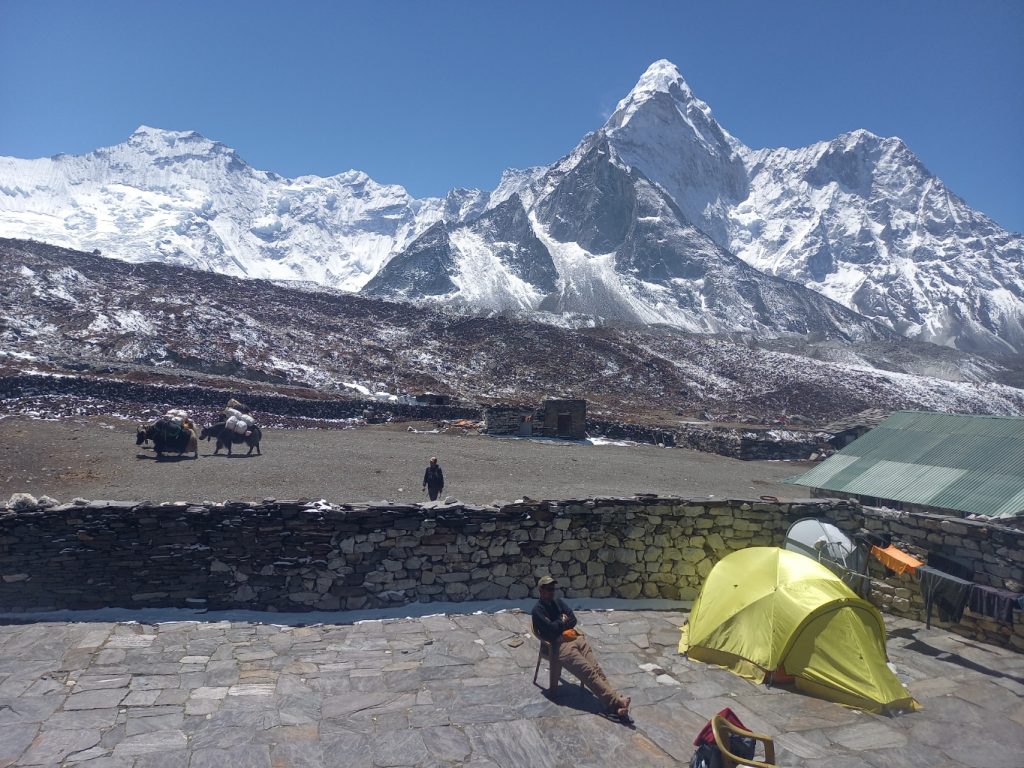
In daylight the spectacular view to nearby Ama Dablam (6856m) became apparent. The mountain was climbed by York Mountaineering Club in 1990, the expedition included Steve G, and was the first British team to summit this peak.
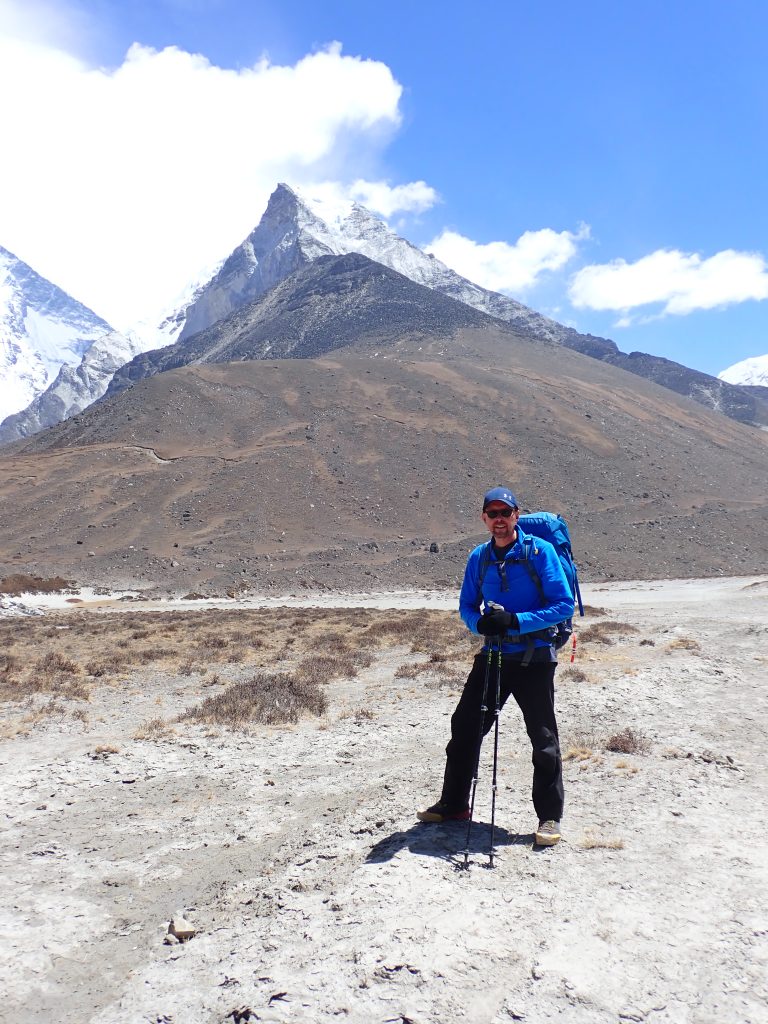
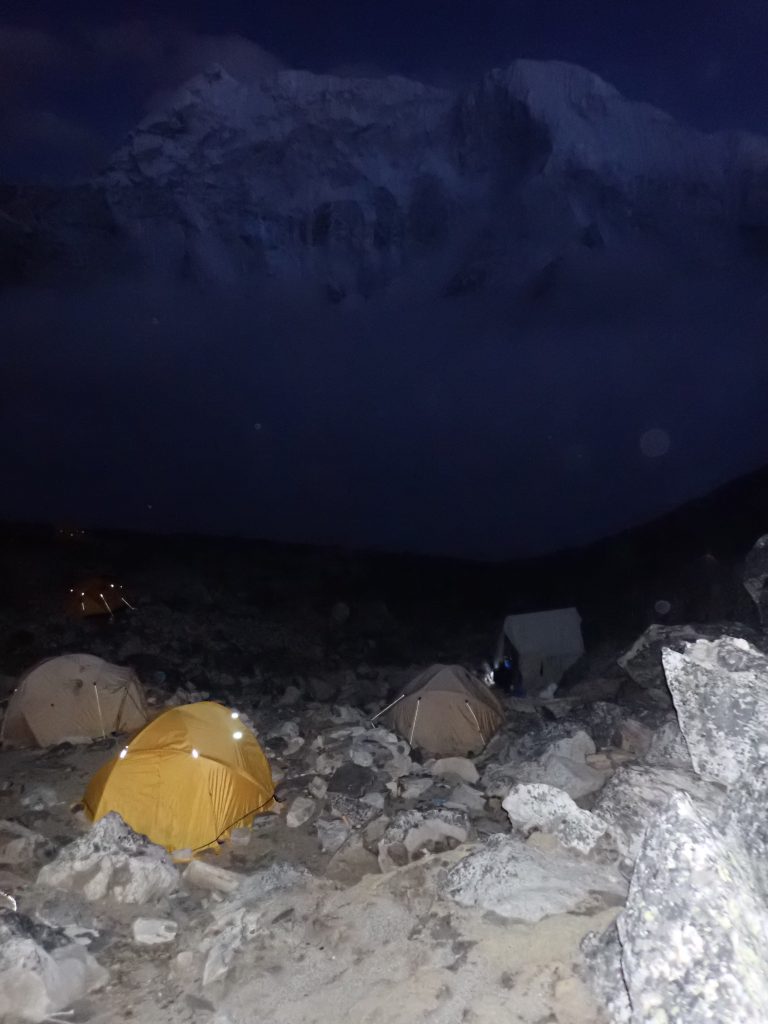
After our rest day the group trekked eastwards up the valley to Island Peak Base Camp but after taking lunch there continued upward to High Camp (5500m) in preparation for an early start the next morning. We travelled light on this occasion since we would return to Chukung after reaching the summit.
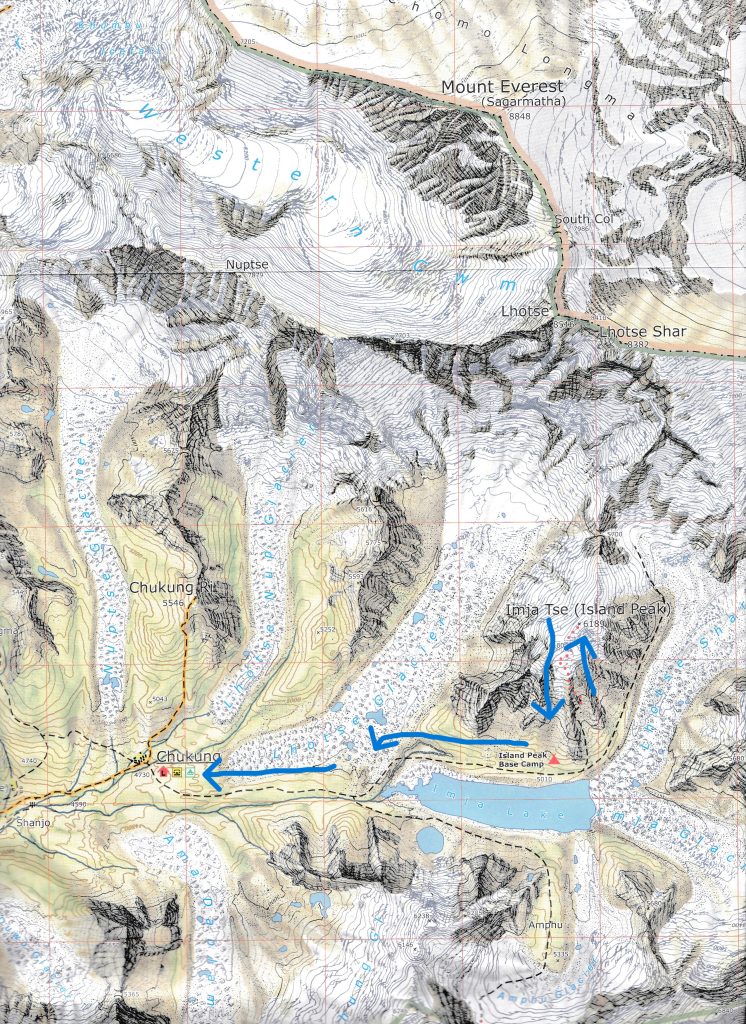
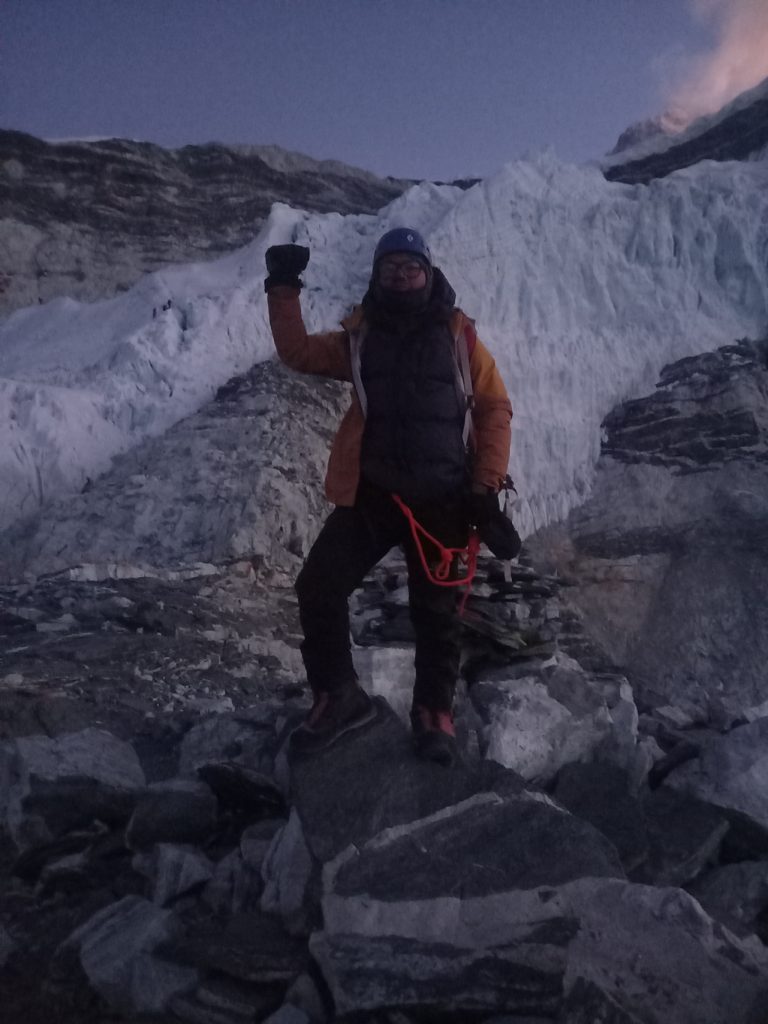
Another 2am start and a more technical route to the summit was expected today. The weather was perfect. Relatively mild with no wind and clear sky. Down clothing was carried but not needed. Steady progress was made but one member of our group returned to High Camp before we arrived at the glacier. It was beginning to get light when we reached the glacier traverse which involved crossing a crevasse via an awkward snow bridge where previously there had been ladders. Onto the headwall of ice and rock just prior to the summit ridge the route became busier with other climbers. Here was a more physical and technical challenge. Fixed ropes and jumar ascenders were needed and the condition of ropes and security anchors were constantly being checked by our Sherpas. Global warming had been playing havoc with the condition of the ice and coupled with the popularity of the route there was plenty of evidence of deterioration. Ice falling from climbers above was another serious threat.
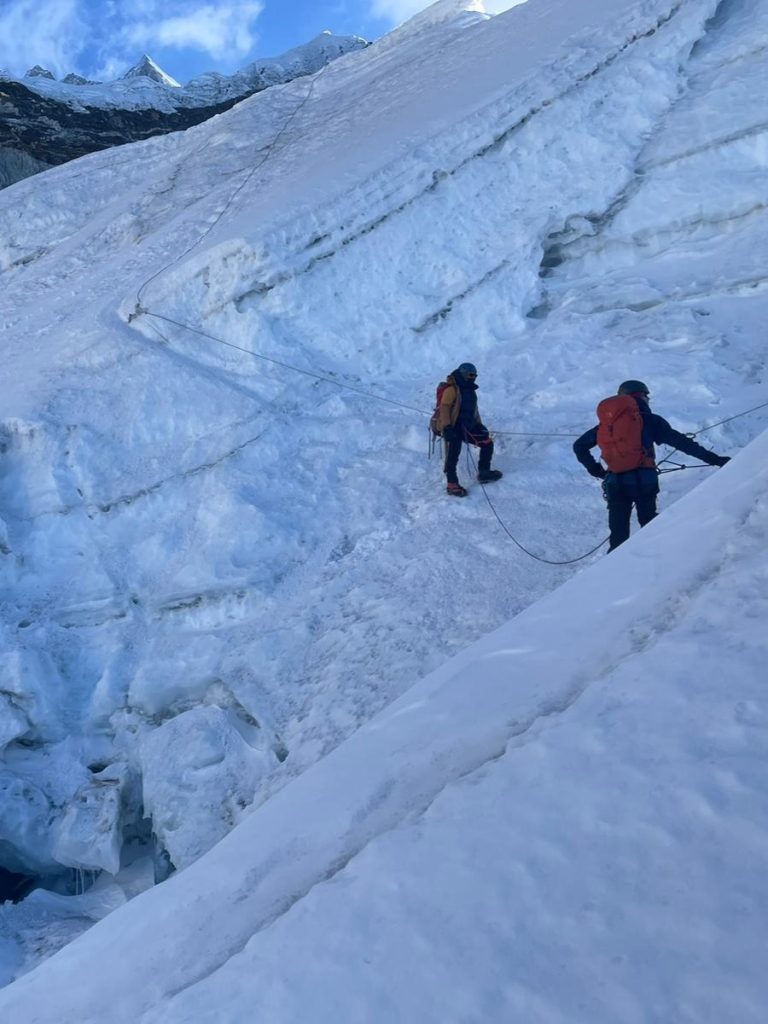
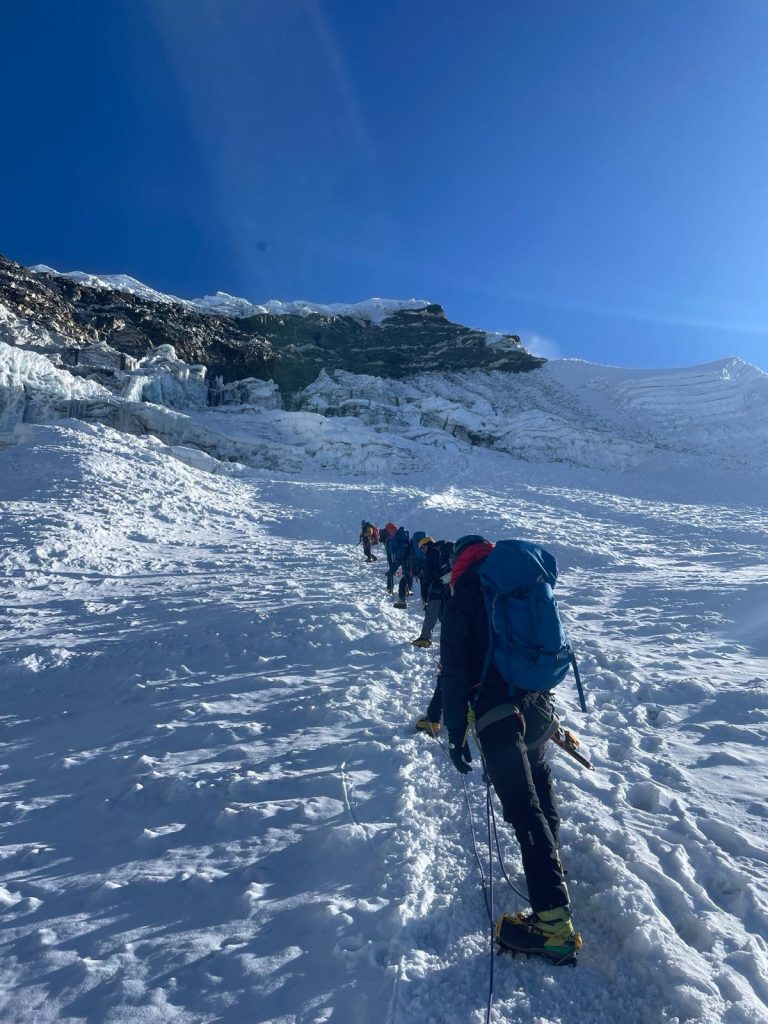
At the top of the headwall the narrow ridge, with fixed line was followed to the summit of Island Peak (6189m). It was another glorious, clear morning in bright sunshine and almost calm wind. The group was all together and enjoyed the collective sense of satisfaction. Photographs were taken, the views to adjacent Lhotse (8516m) and so many stunning, surrounding peaks were absorbed and after a brief rest the team commenced descent.
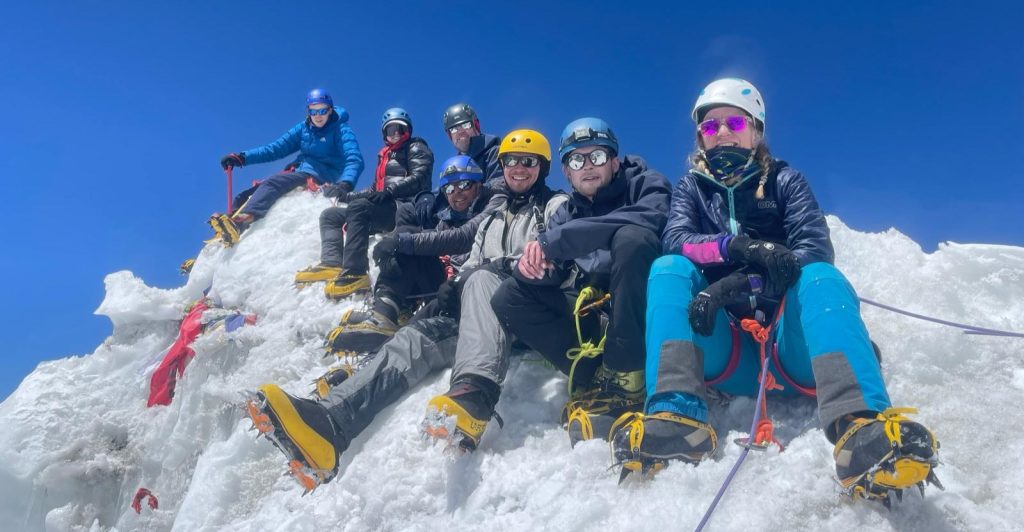
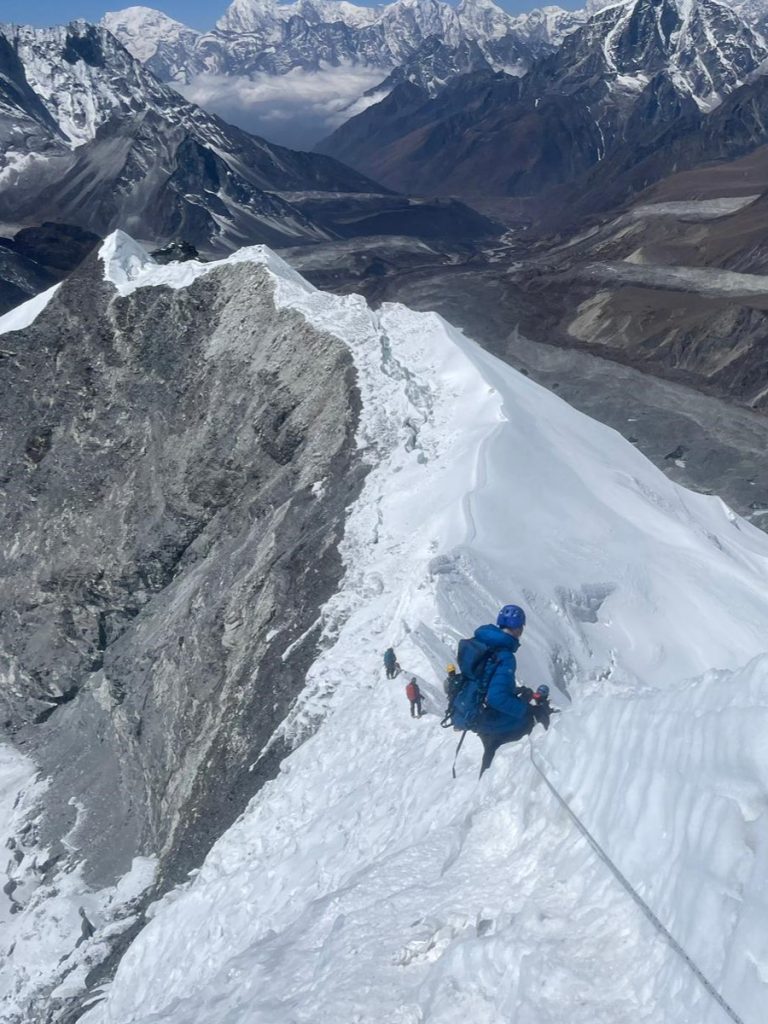
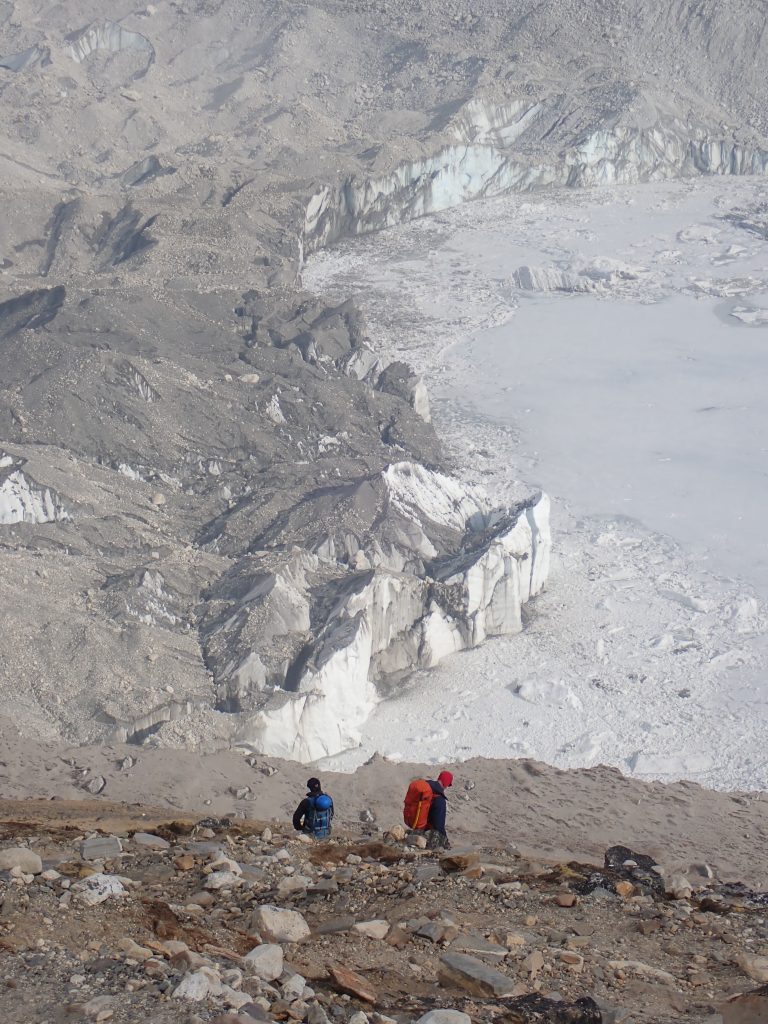
Derek and Dave continued ahead of the main party, carefully checking fixed ropes and anchors before choosing a line to abseil. The Sherpas helped the remainder of the group who had little experience in such matters. Everyone regrouped at the edge of the glacier and continued down to High Camp. Disaster struck for Janga at the crevasse when his mobile phone made off like a miniature bobsleigh, sliding like a bullet across the ice just in front of Derek and vanishing downwards into the bottomless chasm. Doh!
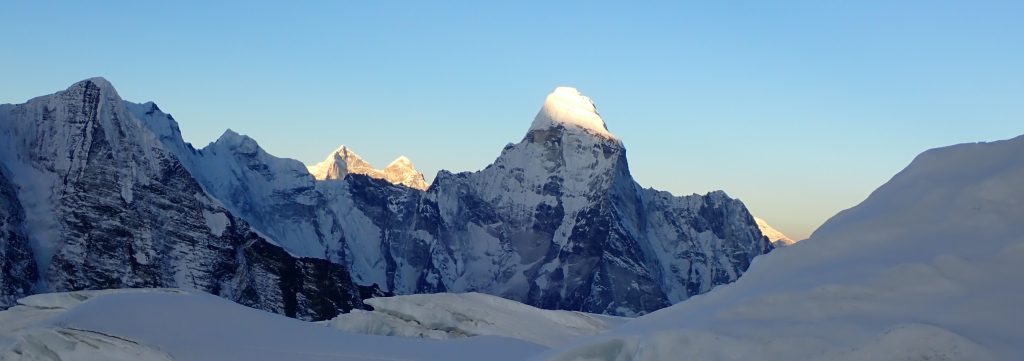
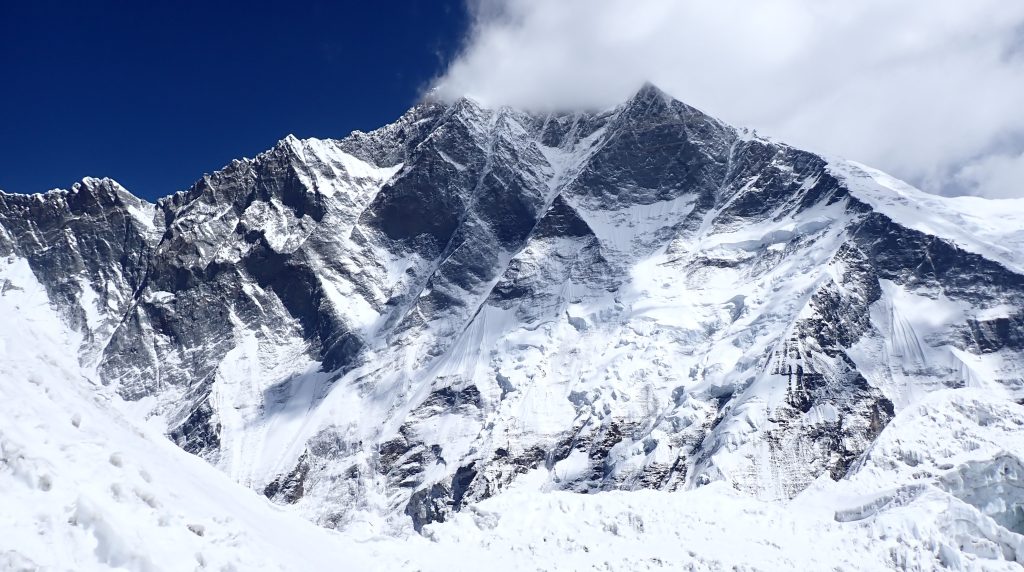
A brief stop was made at High Camp for tea and change of clothing. It would be dark again before we reached our familiar lodge at Chukung.
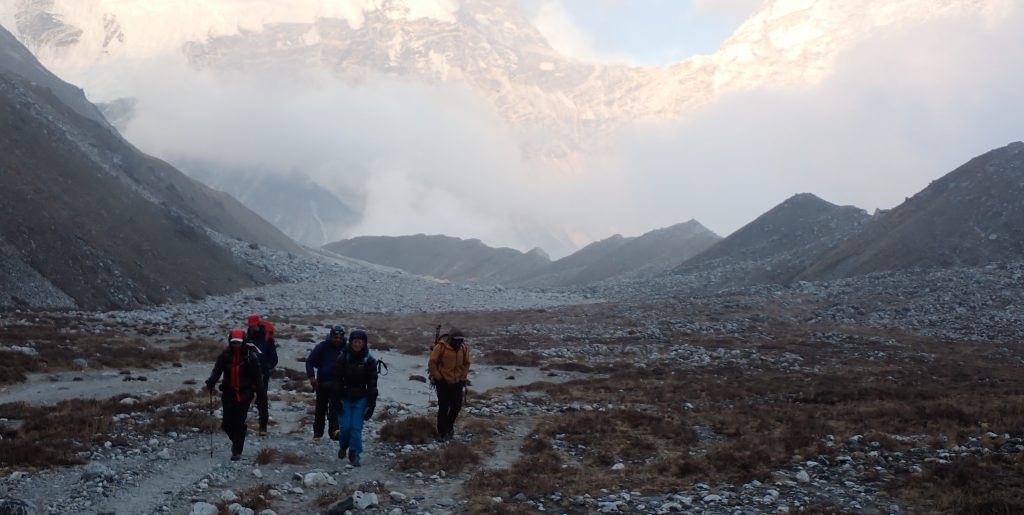
The next three days were relatively straight forward as we made our way back to Lukla. Pangboche (4000m) was our next night stop, followed by the legendary Sherpa centre of Namche Bazar (3500m) where Dave celebrated with another shower. Lukla was next. The route now followed the main Everest trail and there was a vast difference to the remote areas we had previously visited. The path was rammed with trekkers and tourists from all nations alongside porters and donkey trains loaded with goods to support the Everest camps and general tourism. Helicopters were flying up and down the valley delivering people and supplies to Everest Base Camp. Tea shops were busy, all making the most of the trekking and mountaineering season. It was wonderful to see money changing hands to help boost the Nepalese economy, although the noise and bustling circus of travellers reinforced the notion that we had made a good choice in taking the long way around and had benefited by seeing Nepal in its raw and more natural state.
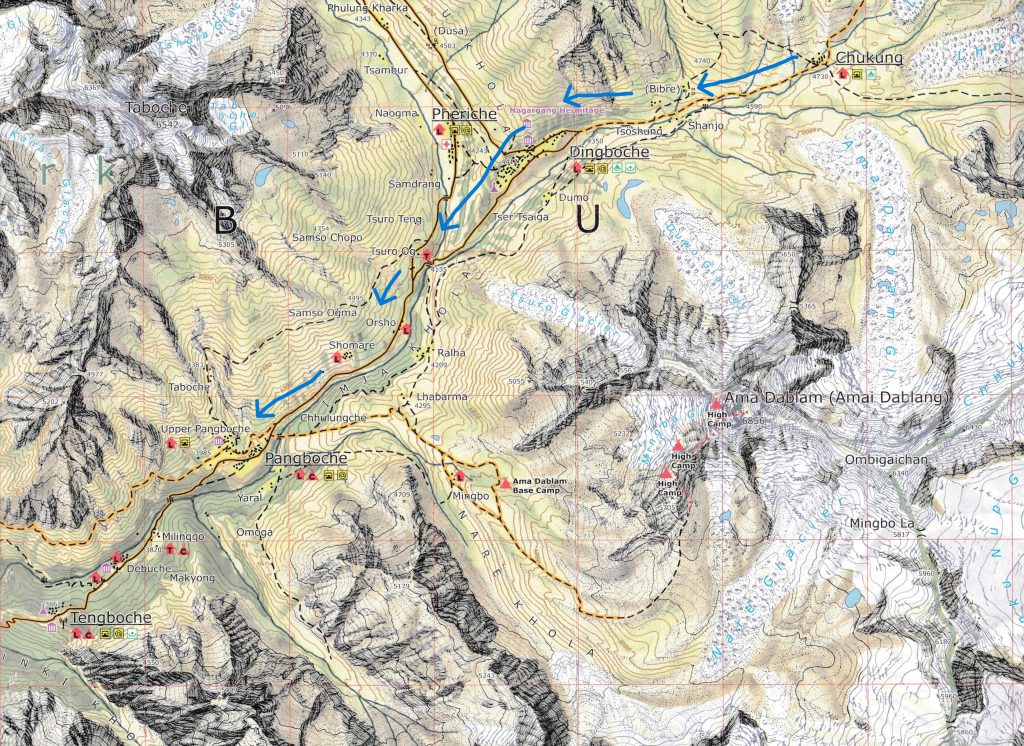
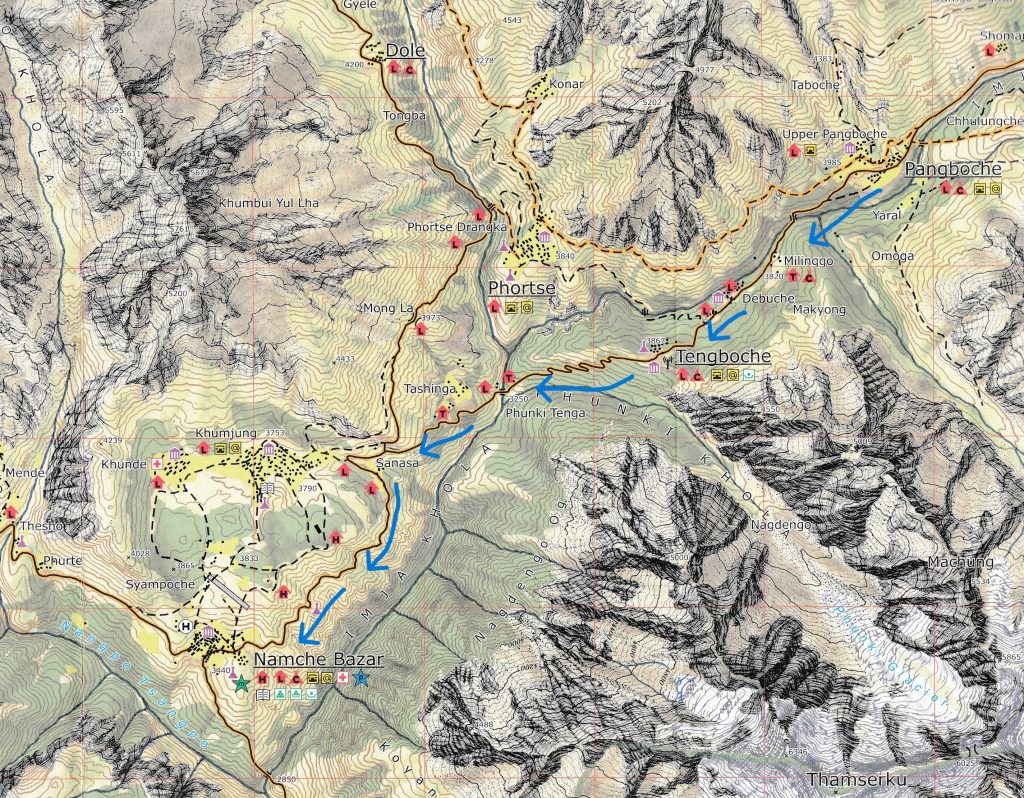
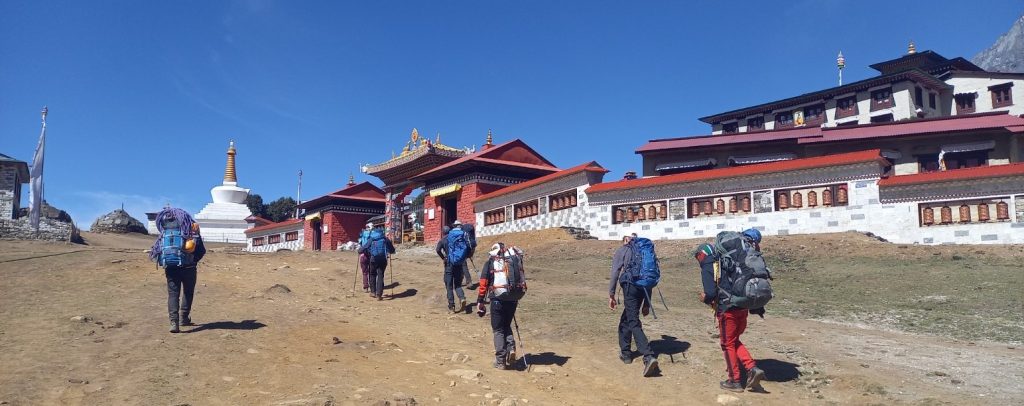
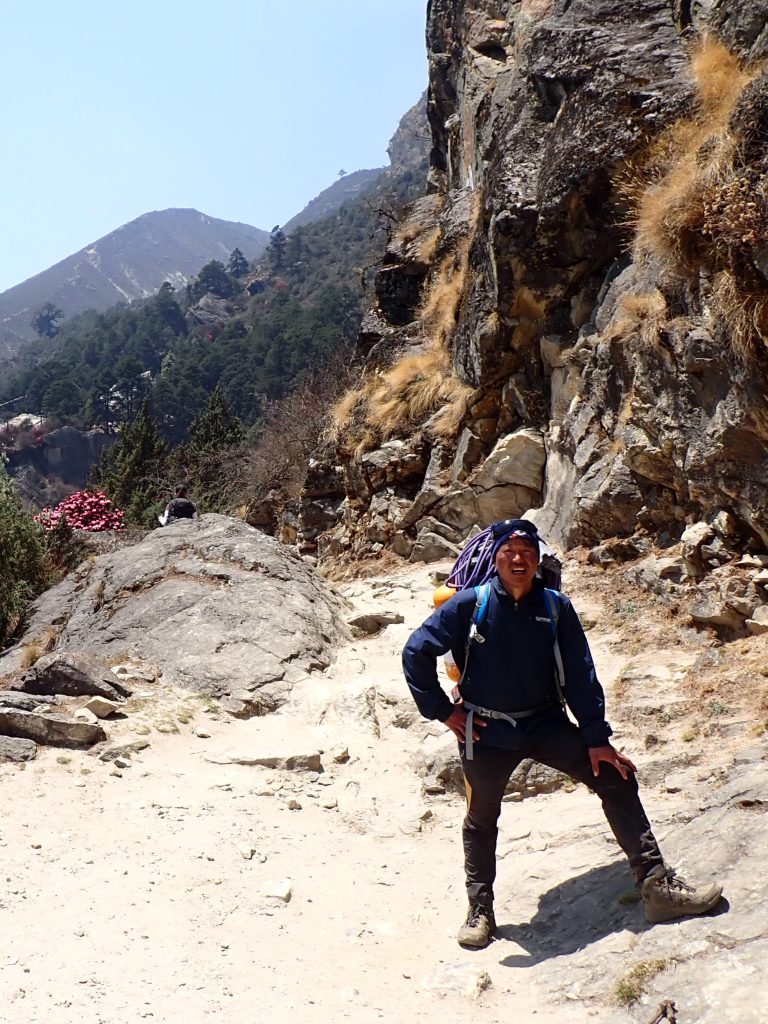
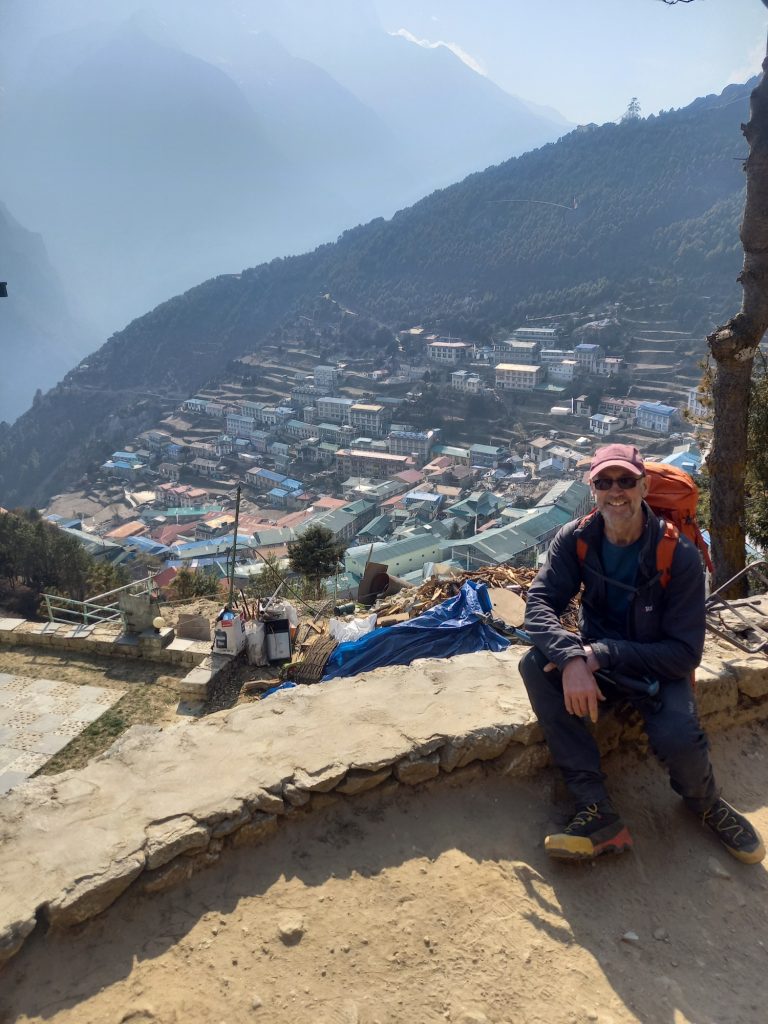
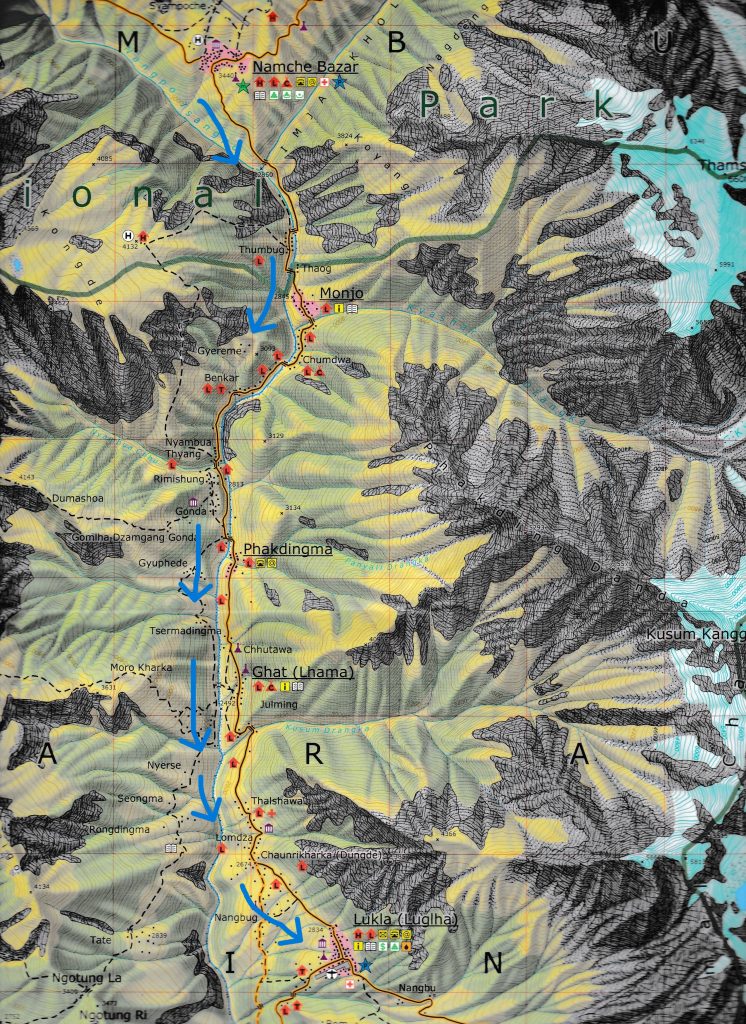
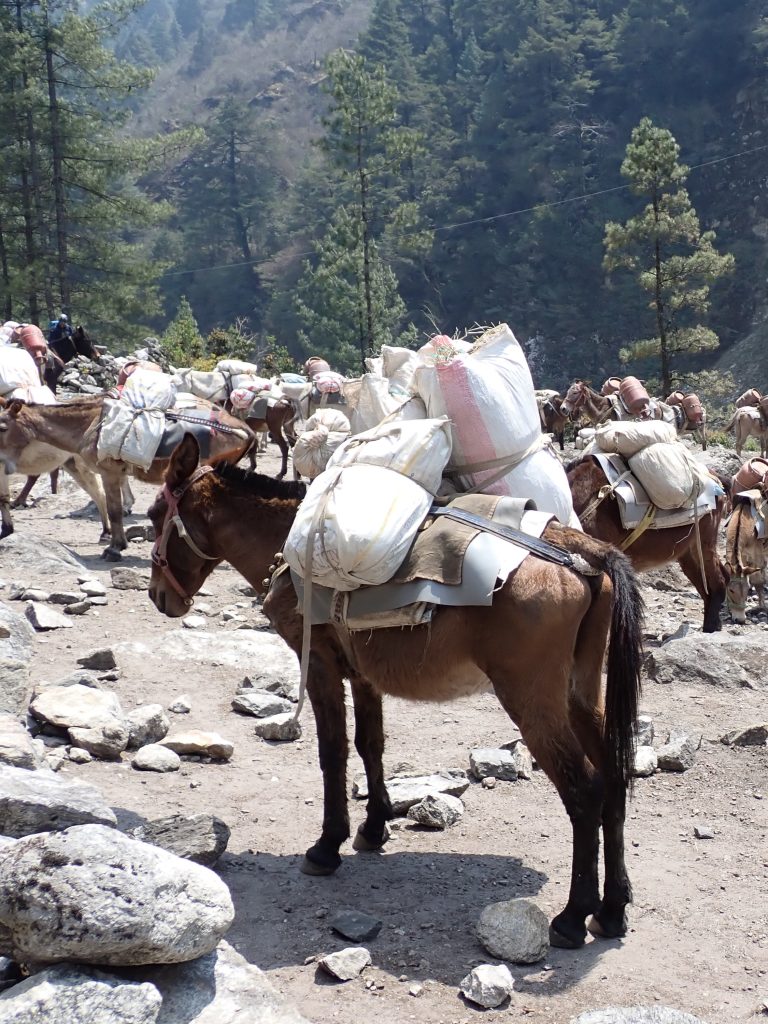
In Lukla we celebrated the end of our three-week trek. The Sherpas and porters joined us and together we enjoyed our evening meal, a few drinks and Nepalese music and dancing. It was a wonderful occasion and a fitting end, allowing us to thank our support team for their massive contribution to help deliver such an incredible and memorable experience. Carrie made a short speech and tips were paid before porters and Sherpas dispersed back to their farms, families, studies and further expeditions.
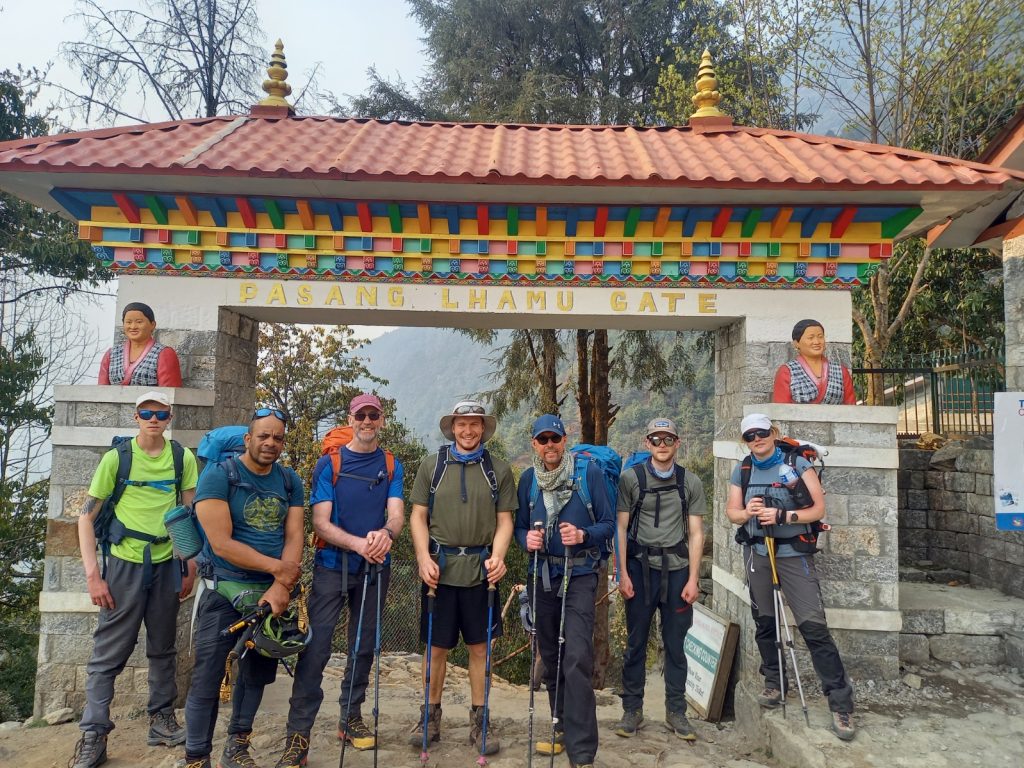
The flight to Ramachap departed early the next morning. Boarding and baggage management at Lukla airport had a unique system but incredibly, we and all of our gear arrived in the right place. The long drive to our hotel in Kathmandu was more interesting and perhaps less alarming in daylight. At the hotel we had time for sightseeing and celebration. Owing to consistently good weather during our trek we had not used our spare days so remained around the hotel before our flights home. Dave visited a barber to improve on his Father Christmas look. Somehow lost in translation the visit took an hour and included haircut, shave, head, neck, arms, hands and upper torso massage before being sprayed down with scent. On another day Derek and Dave did a taxi tour visiting popular temples in Kathmandu. In the evenings we all went out together for a meal and possibly drinks, an eating competition or even karaoke.
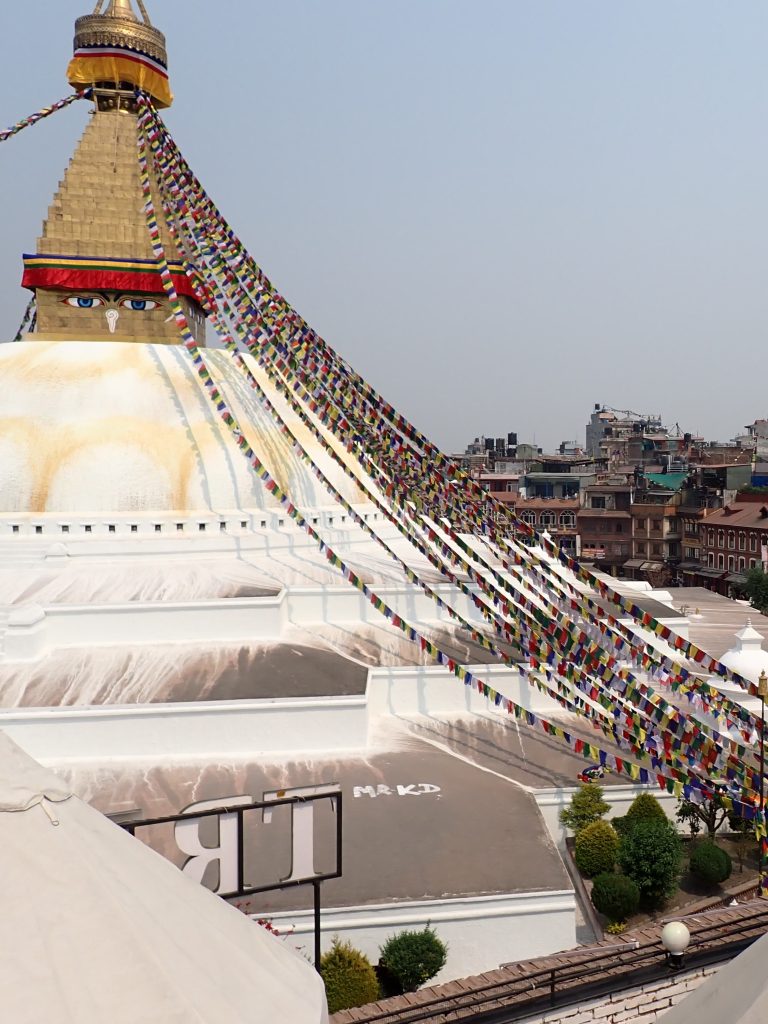
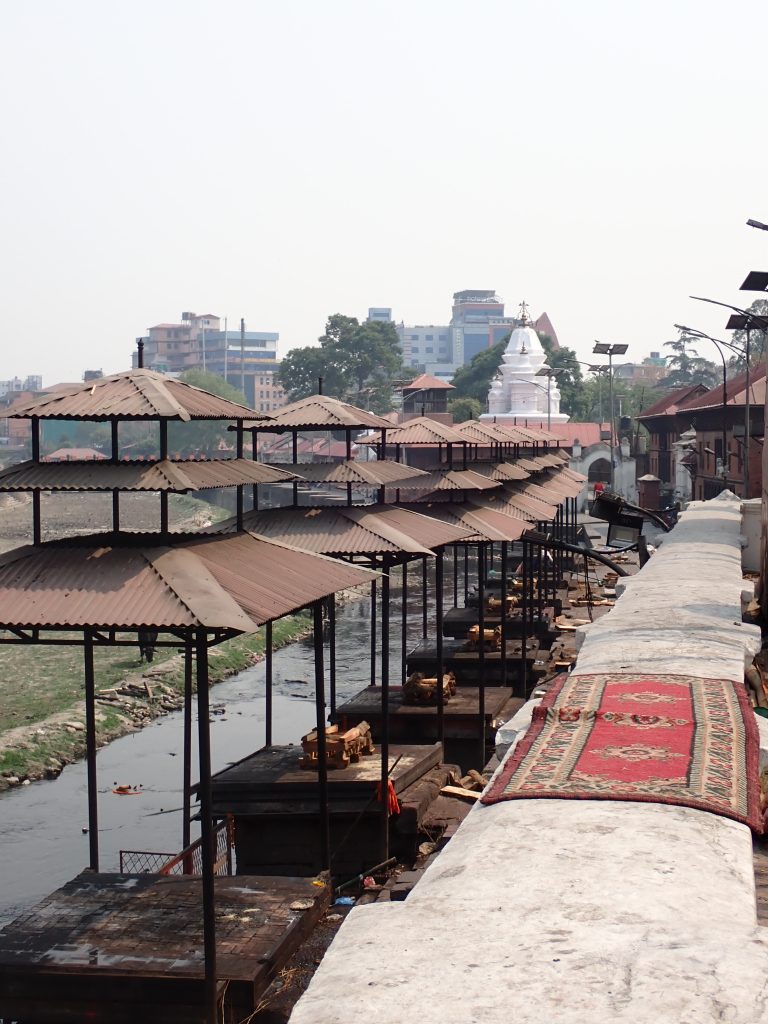
After days of chilling out, behaving like tourists and wondering how to fit all our gear and shopping into our bags the final flights home via Doha to Manchester were largely uneventful. There was a prompt connection in Doha this time and another when the train from Manchester Airport to York was running on schedule.
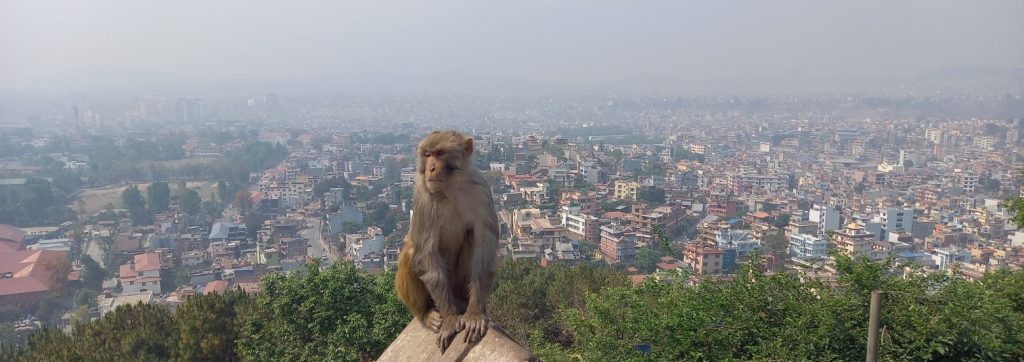
The expedition had been a complete success for Derek and Dave. The lasting sense of achievement after standing on the summits of Mera and Island Peak in such perfect conditions fully justified the time and cost of such a trip. The organisation by Adventure Peaks and Carrie was great and our support staff in Nepal could not have been better. Throughout the trip our group worked hard and maybe on occasion individuals suffered with fatigue or diet but everyone got on exceptionally well and continued to encourage and support each other right to the end. The trip was much more than a simple trek in the mountains and there was a unanimous warm feeling of broad ranging satisfaction when reflecting on what had been witnessed and accomplished by everyone there.

Thanks to everyone, especially Derek for being so easily talked into it. Cheers!
Dave M

